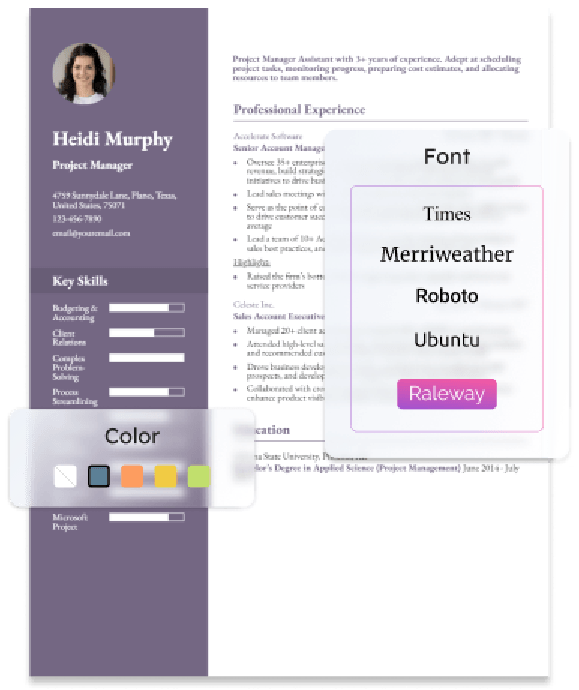In the world of finance, accuracy and a strong grasp of numbers are not just valued qualities but essential prerequisites for success. As an aspiring accounting assistant or a seasoned professional looking to advance your career, your resume serves as a critical tool for showcasing your financial acumen and administrative prowess. In today’s job market, organizations rely on financial integrity. A well-structured resume can be the key to unlocking your potential as a valuable asset in the accounting field.
We will guide you through the fundamental steps of crafting a compelling resume tailored to the role of an accounting assistant. From emphasizing your proficiency in financial software to highlighting your problem-solving abilities, we’ll help you create a resume that shines in the world of finance and accounting.
“Accounting assistant resumes should demonstrate organizational skills, software knowledge, and support for financial operations. Show how you contribute to accuracy and efficiency.”
— Carolyn Kleiman, Resume and Career Advisor
Most Popular Accounting Assistant Resumes
Entry-Level Accounting Assistant Resume
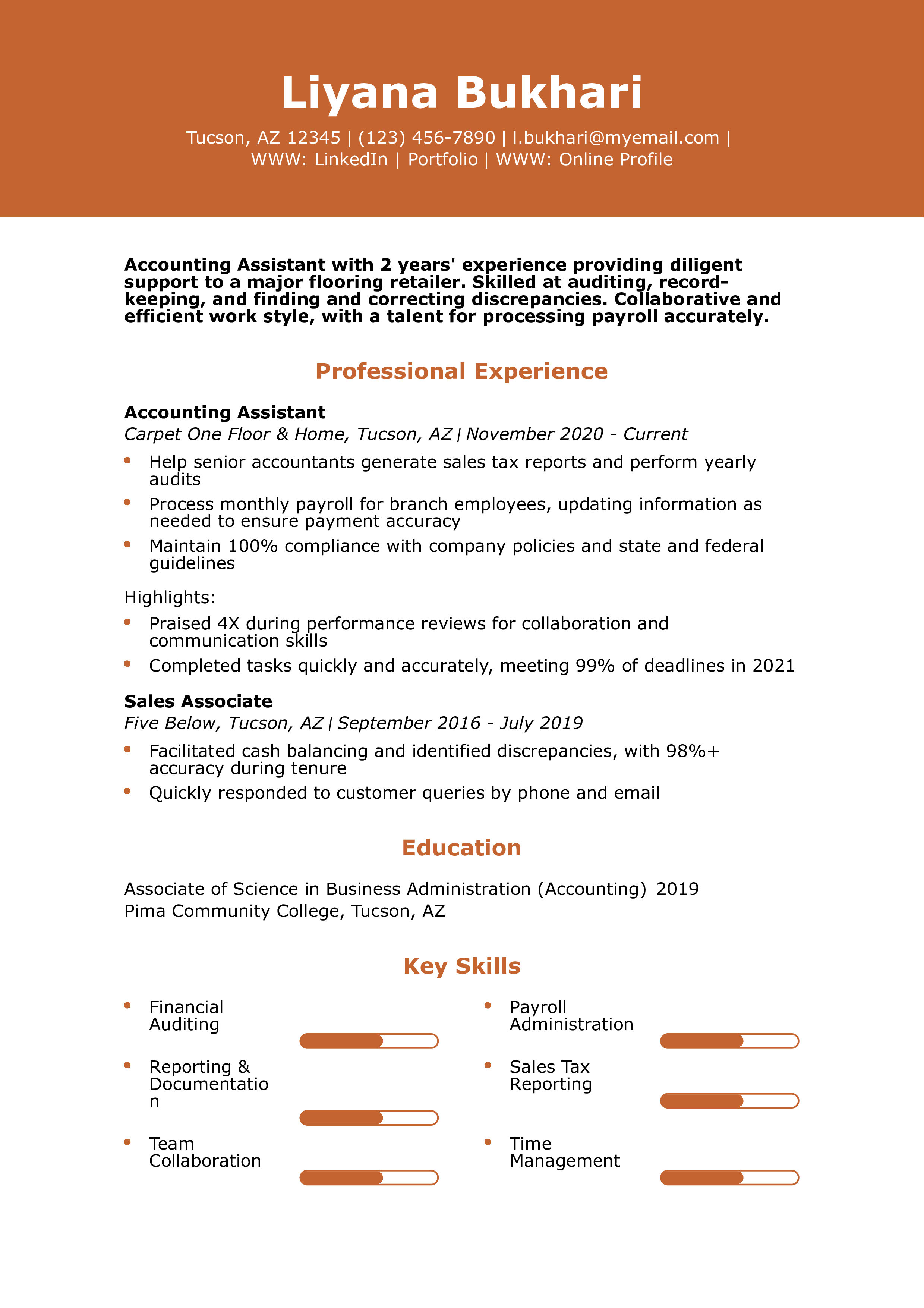
Mid-Career Accounting Assistant Resume
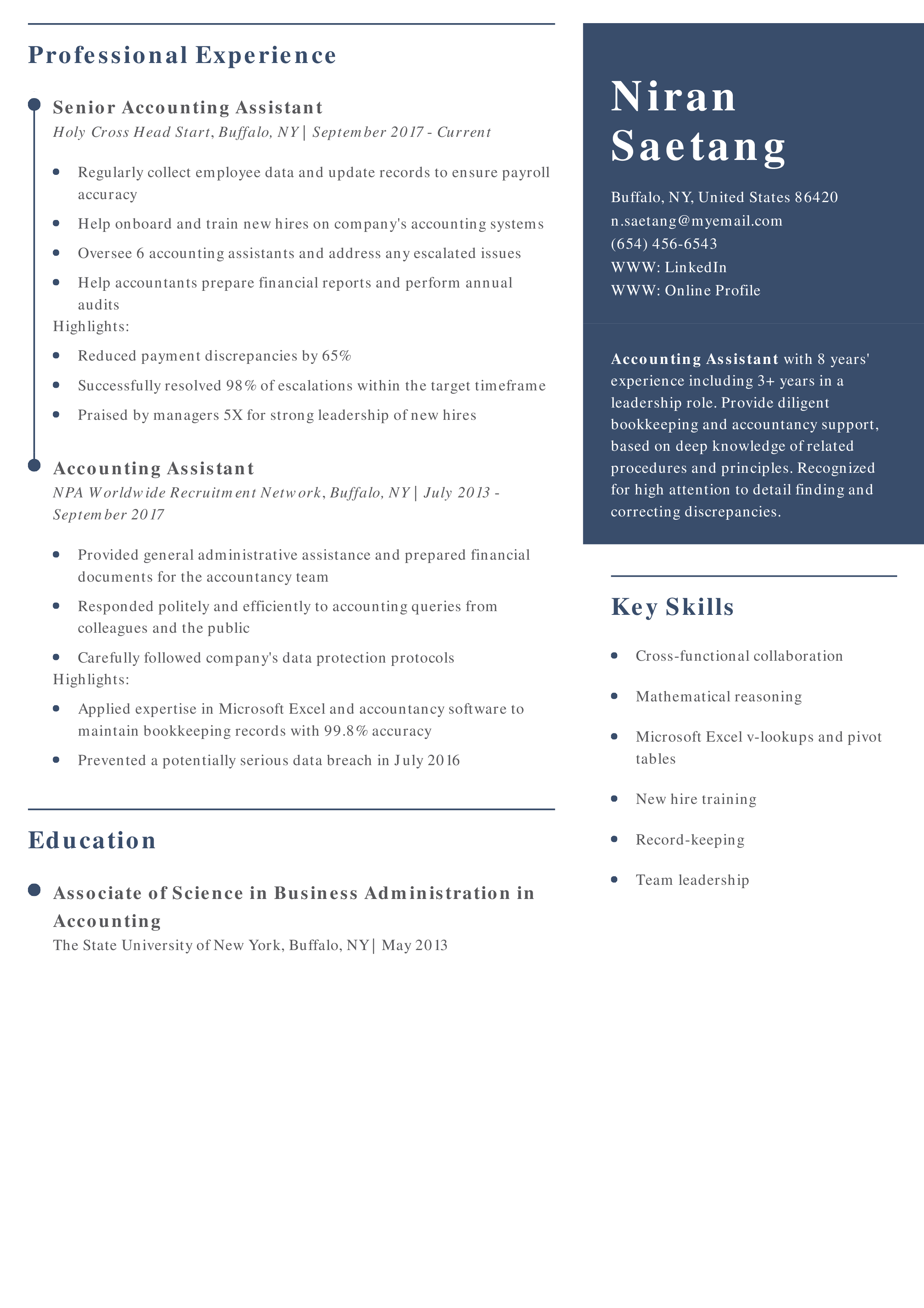
Senior-Level Accounting Assistant Resume
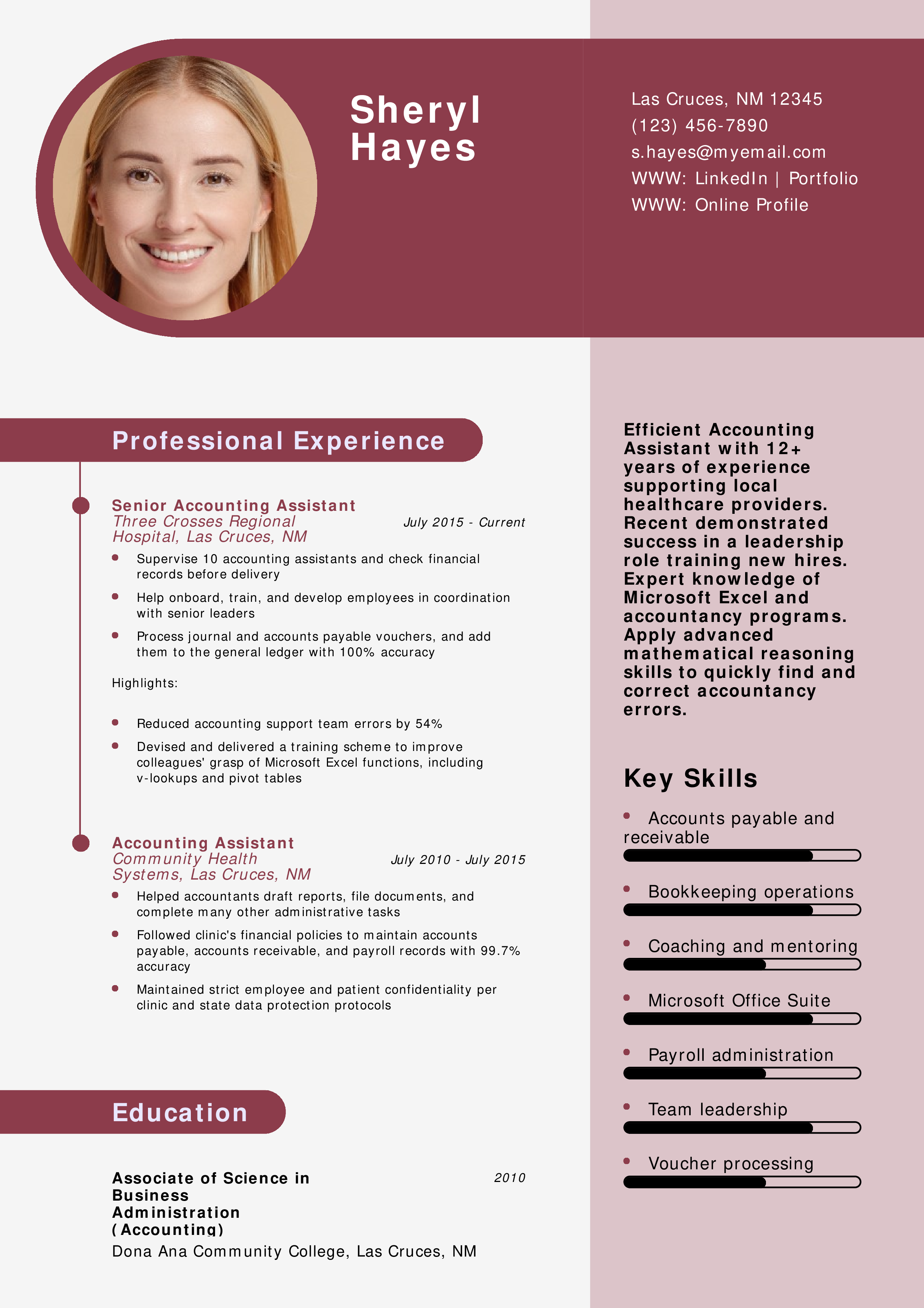
Tax Accounting Assistant Resume
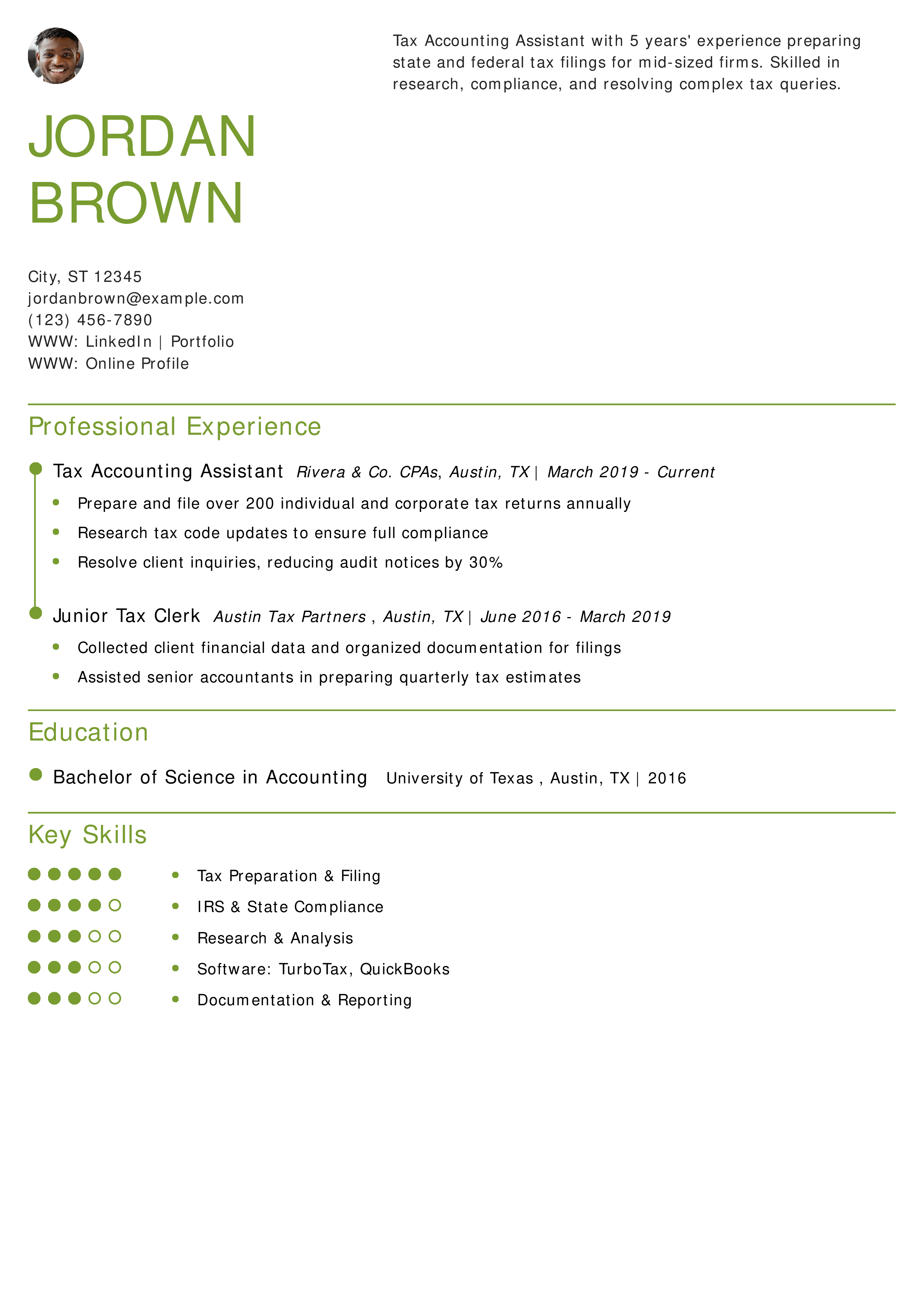
Why This Resume Is a Great Example
Jordan’s resume highlights a specific reduction in audit notices, showcasing true value. The clear listing of tax software skills further strengthens credibility.
Key Tips
Detail software proficiencies and compliance achievements to set yourself apart. For more on listing certifications and tools, see how to list certifications on a resume.
Accounts Receivable Assistant Resume
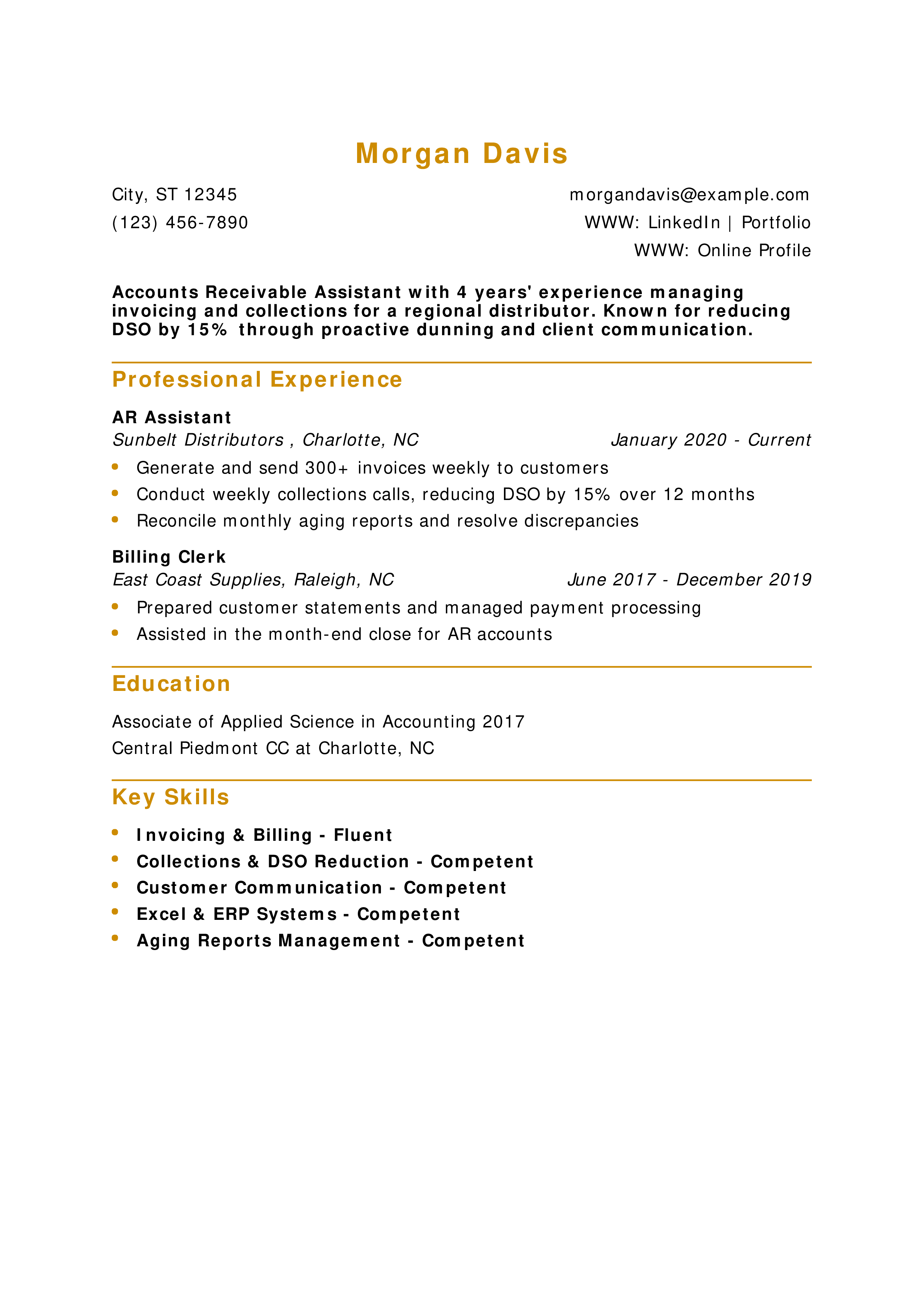
Why This Resume Is a Great Example
Morgan’s resume quantifies DSO improvements and emphasizes proactive client engagement, key for receivables roles. The blend of technical and communication skills is spot-on.
Key Tips
Use metrics like “reduced DSO by 15%” to showcase impact. For more tips on structuring your results, see resume summary examples.
Payroll Clerk Resume
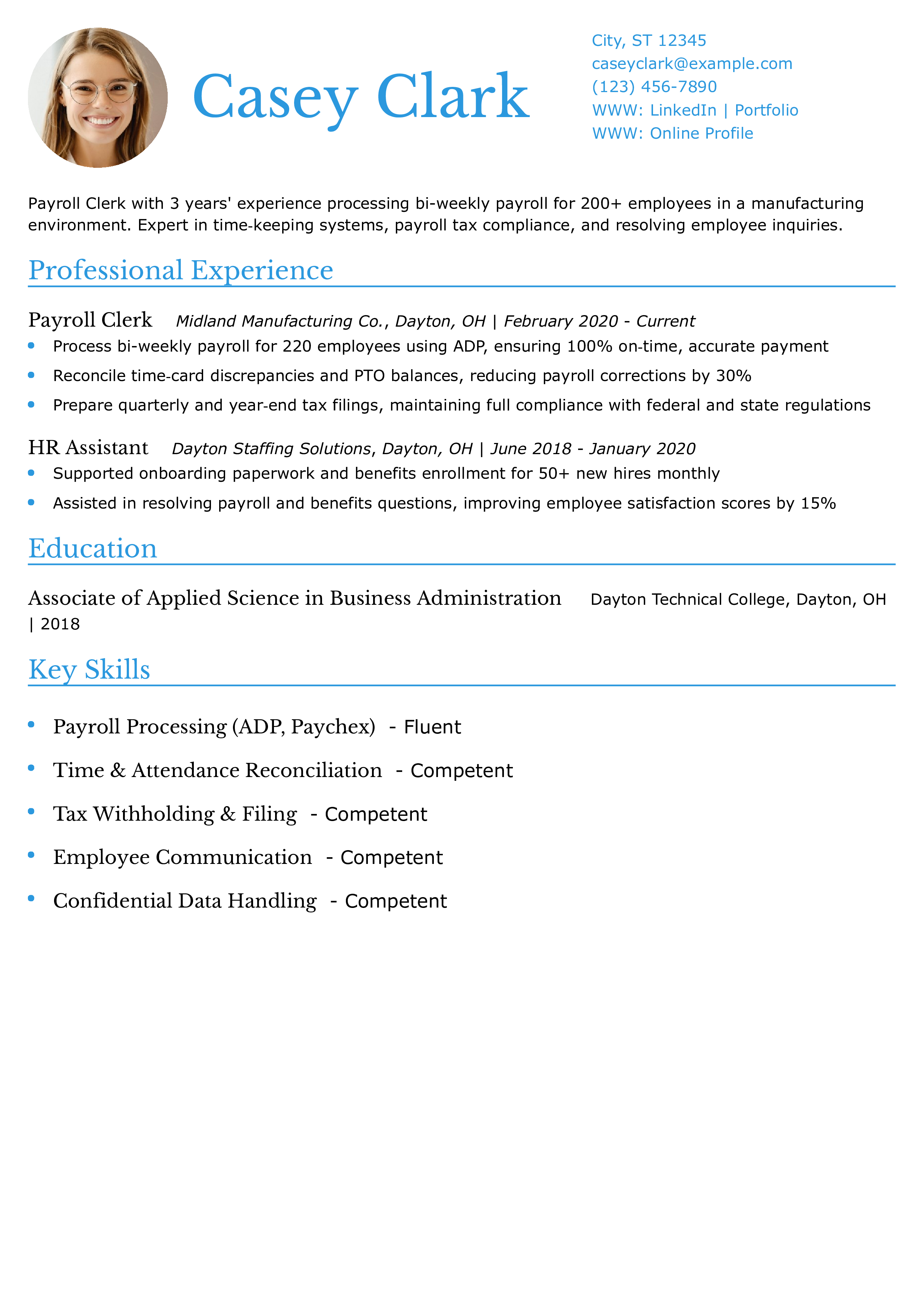
Why This Resume Is a Great Example
Casey’s resume quantifies a 30% reduction in payroll corrections and highlights full compliance, which is critical for payroll roles. The clear structure makes it easy for recruiters to see both technical and communication strengths.
Key Tips
Automate metrics wherever possible (e.g., “reduced corrections by 30%”) to show your impact. For more on structuring technical sections, see the best resume formats.
Accounts Payable Clerk Resume
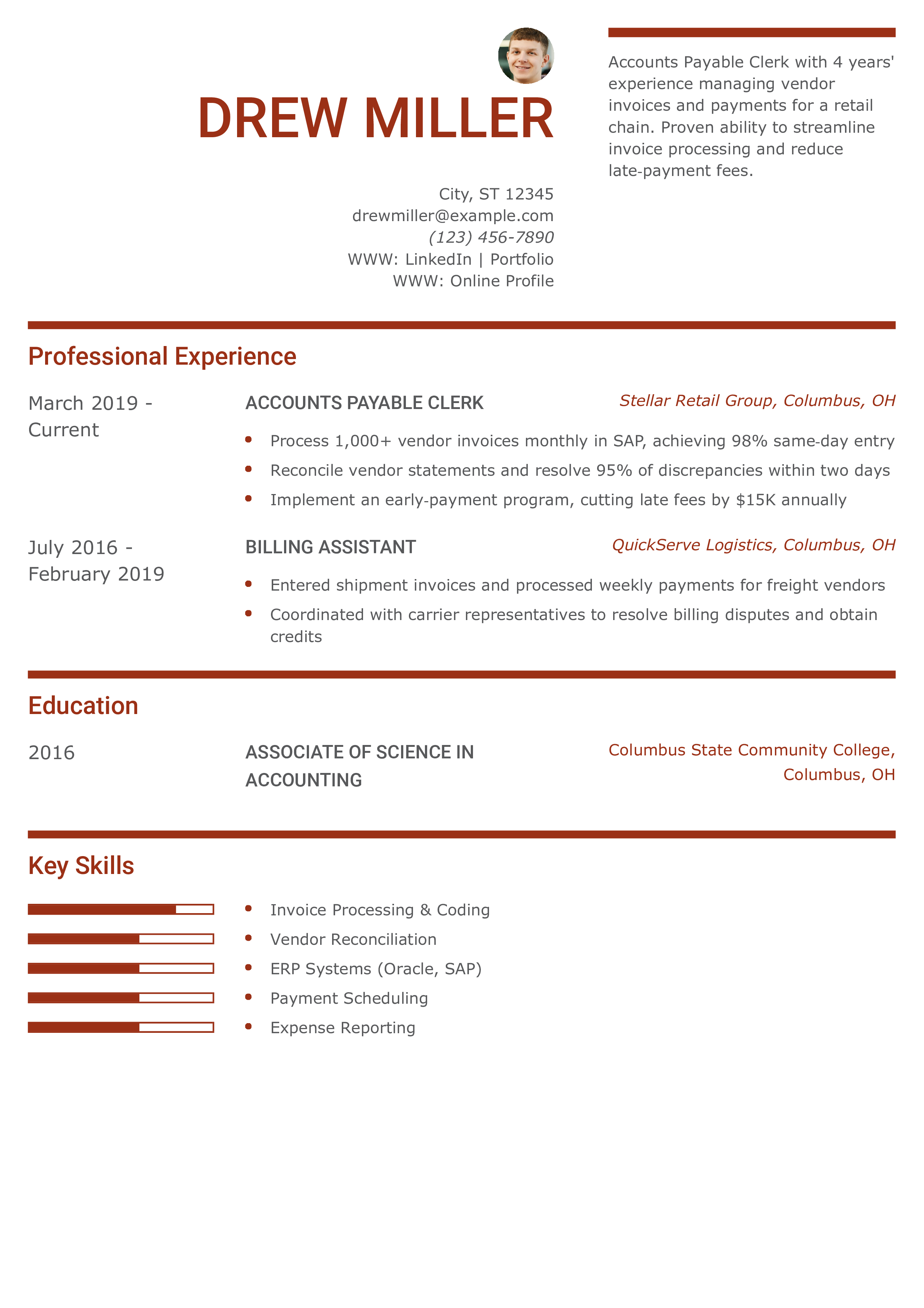
Why This Resume Is a Great Example
Drew’s resume highlights a $15K annual savings and a 98% same‐day entry rate, which are strong metrics for AP roles. The concise layout focuses on relevant ERP and reconciliation skills.
Key Tips
Highlight cost‐saving initiatives to show business impact. For more on crafting results‐oriented bullets, see resume skills.
Billing Specialist Resume
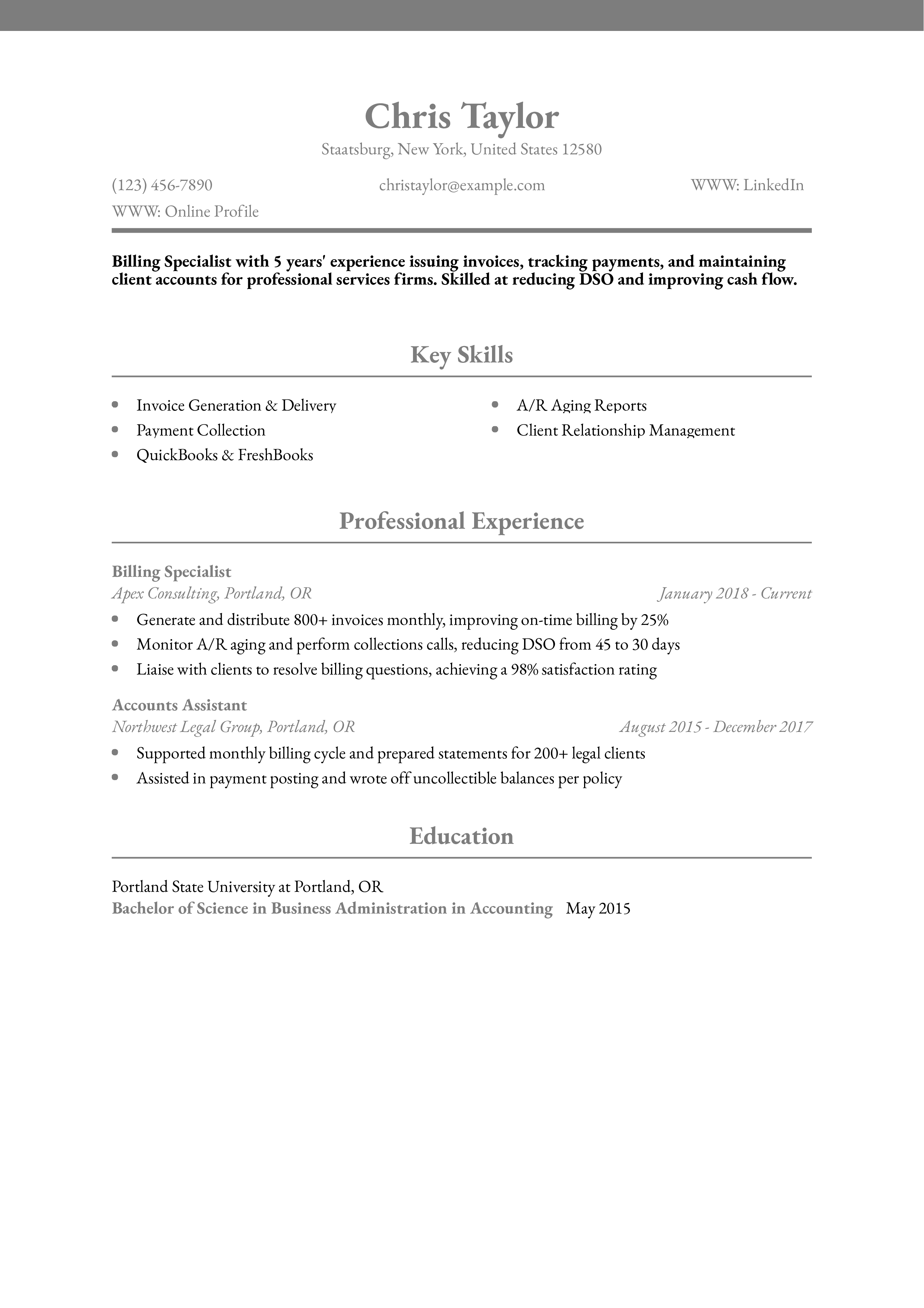
Why This Resume Is a Great Example
Chris’s 25% improvement in on‐time billing and DSO reduction from 45 to 30 days are powerful metrics. Focusing on technical and client‐facing skills balances the role’s dual demands.
Key Tips
Tie process improvements (e.g., “reduced DSO by 15 days”) to business results. For guidance on showcasing metrics, see resume objective examples.
Tax Coordinator Resume
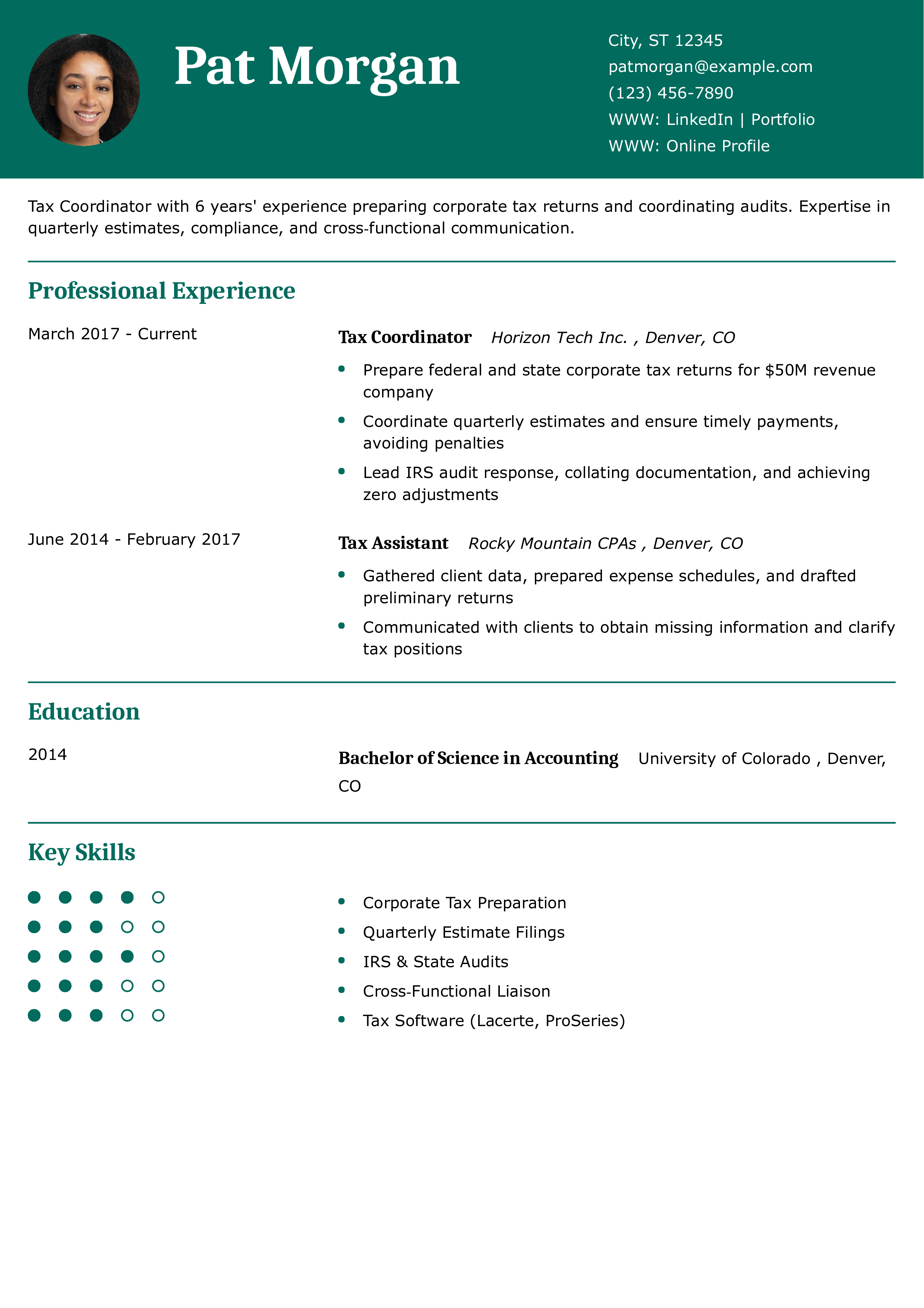
Why This Resume Is a Great Example
Pat’s resume emphasizes zero‐adjustment audit results and timely estimate filings, which are key indicators of accuracy. The mix of software expertise and audit coordination makes it comprehensive.
Key Tips
Emphasize compliance outcomes (e.g., “zero adjustments”) to build credibility. For tips on listing certifications, see how to list certifications on a resume.
Revenue Analyst Resume
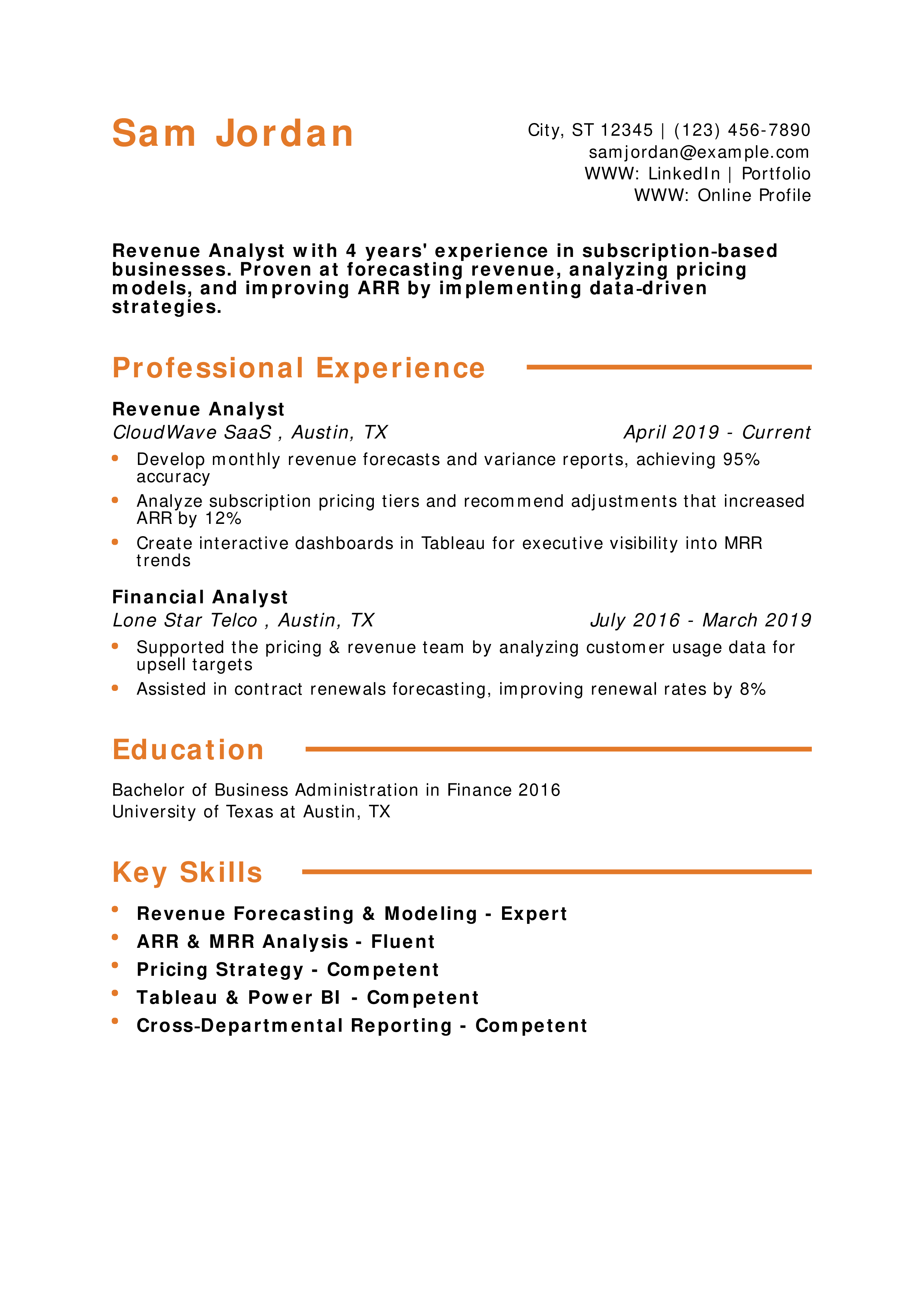
Why This Resume Is a Great Example
Sam’s ARR increase of 12% and 95% forecast accuracy directly link analysis to revenue growth. The inclusion of Tableau skills demonstrates the ability to present insights effectively.
Key Tips
Tie analytics to business metrics (e.g., “increased ARR by 12%”) for maximum impact. For more on data presentation, see technical skills for a resume.
Budget Analyst Resume
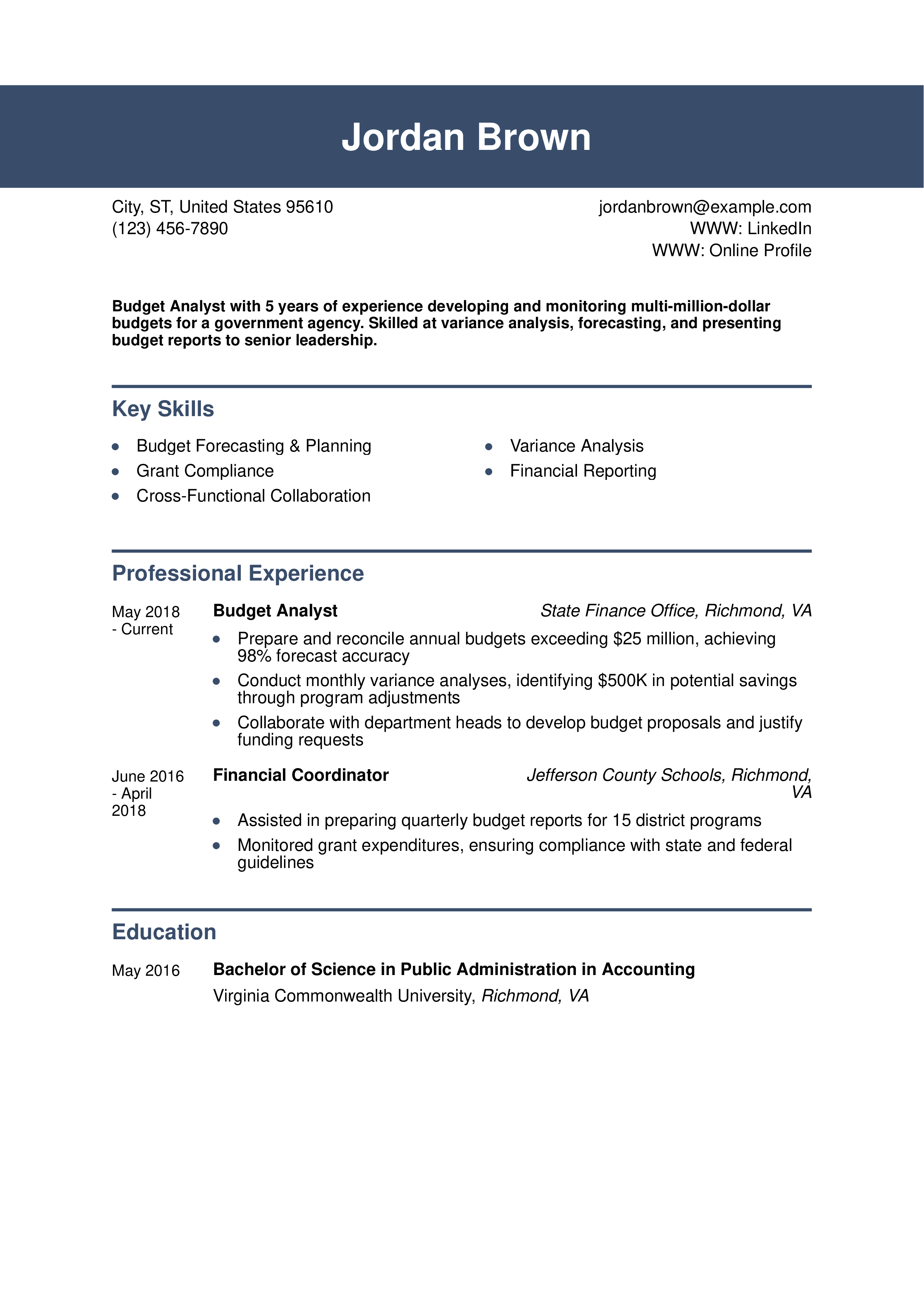
Why This Resume Is a Great Example
Jordan’s resume highlights a 98% forecast accuracy and $500K in savings, demonstrating both technical precision and business impact. The clear, concise format makes it easy for hiring managers to assess their budgeting expertise.
Key Tips
Highlight specific savings or variances you identify to show your analytical value; see our guide on resume skills.
Treasury Analyst Resume
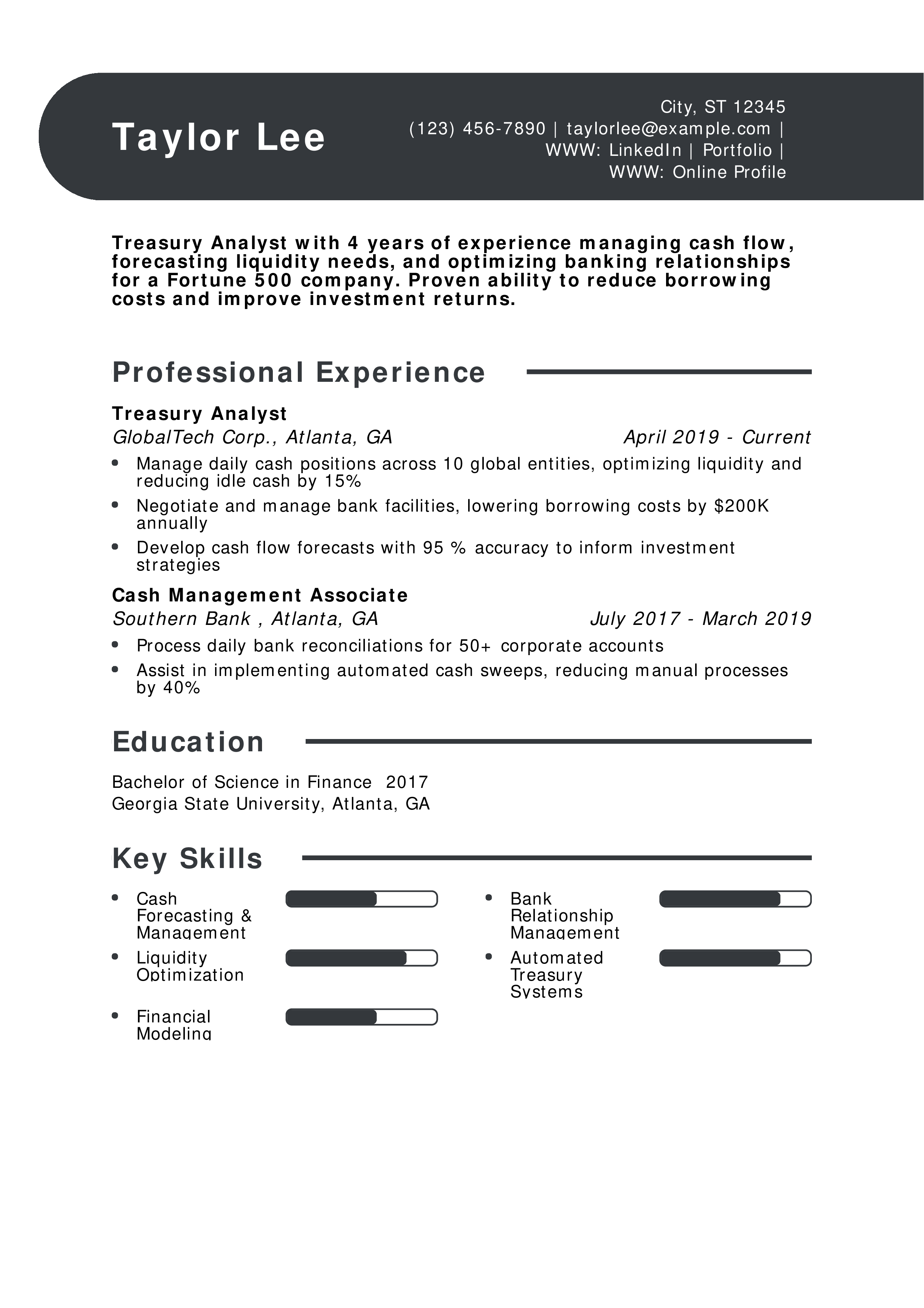
Why This Resume Is a Great Example
Taylor’s resume quantifies a 15 % reduction in idle cash and $200K in cost savings, which are strong metrics that highlight treasury proficiency. The focus on both technical and negotiation skills underscores their strategic value.
Key Tips
Showcase percentage improvements (e.g., “reduced idle cash by 15 %”) to illustrate impact; explore our best resume formats.
Cost Analyst Resume
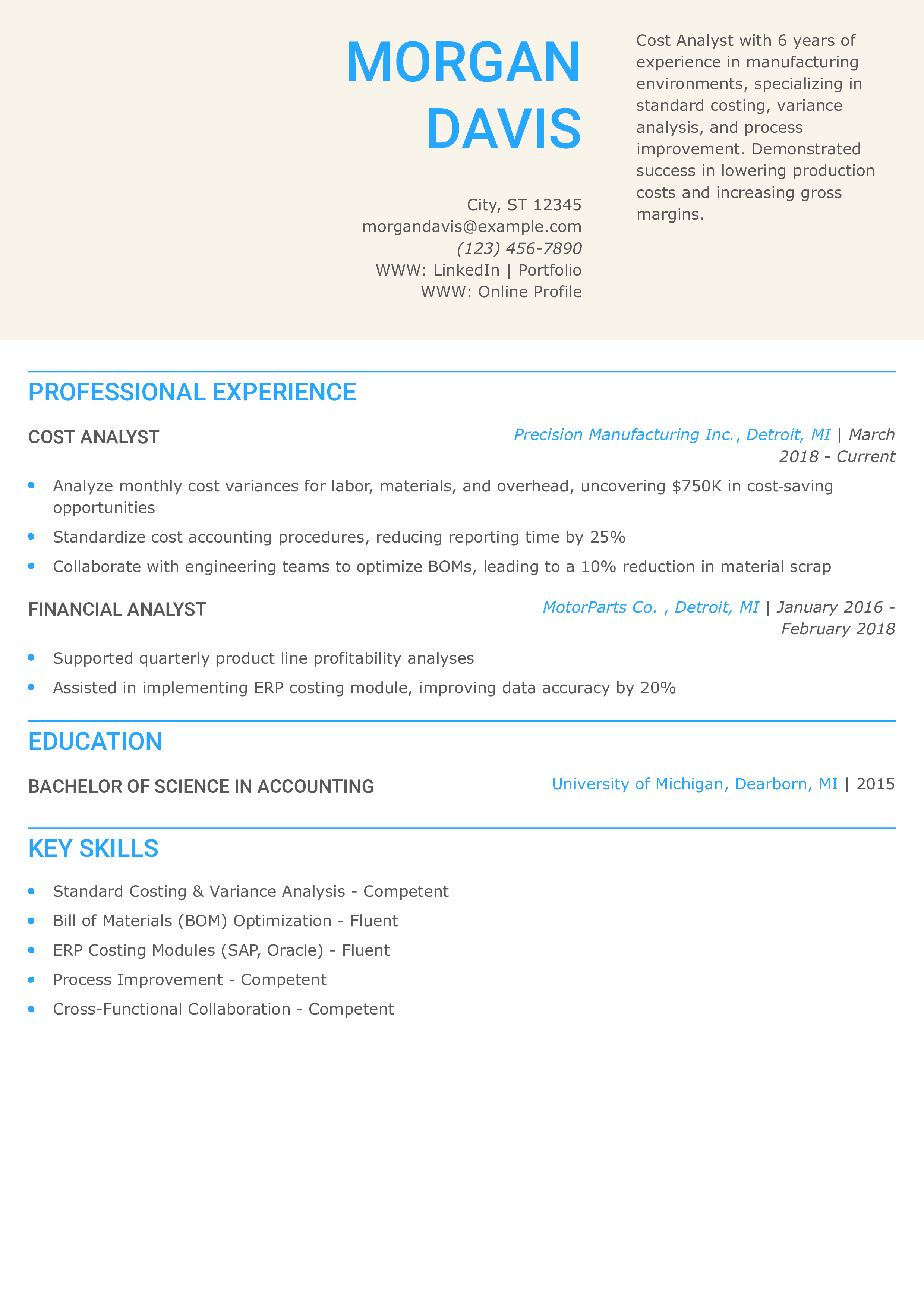
Why This Resume Is a Great Example
Morgan’s resume highlights $750K in cost savings and a 10% scrap reduction, directly tying analytical work to financial outcomes. The clear presentation of ERP expertise further strengthens their candidacy.
Key Tips
Include specific cost savings metrics to demonstrate ROI; for more on quantifying your impact, see resume skills.
Investment Analyst Resume
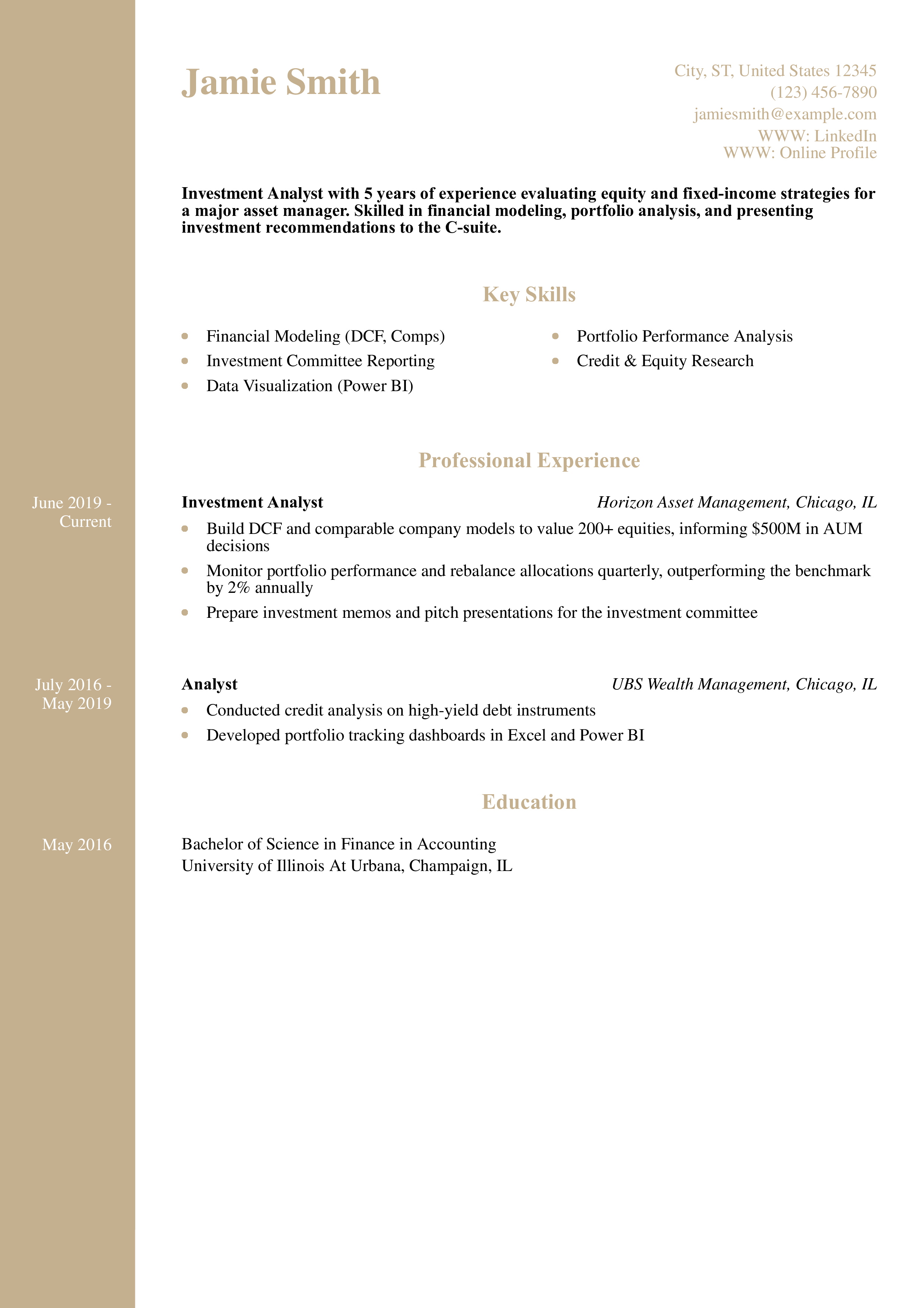
Why This Resume Is a Great Example
Jamie’s resume quantifies outperformance (2% over benchmark) and $500M in AUM, which is strong proof of investment acumen. The inclusion of both modeling and presentation skills shows a well-rounded analyst.
Key Tips
Highlight performance metrics and AUM managed to showcase credibility; see our how to make a resume guide for formatting ideas.
Compliance Analyst Resume
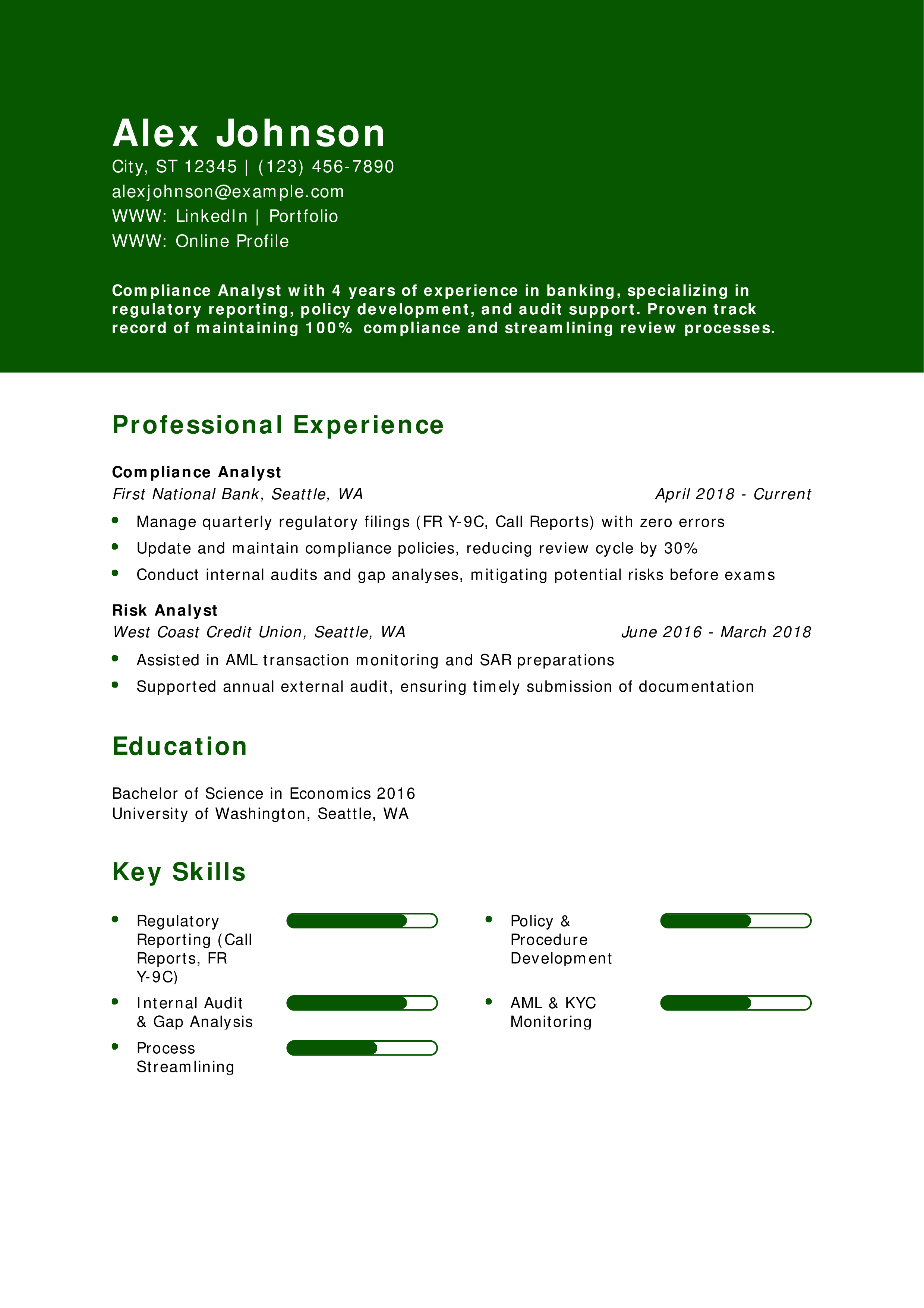
Why This Resume Is a Great Example
Alex’s resume emphasizes zero‐error filings and a 30% cycle reduction, indicating compliance efficiency. The blend of audit and policy work demonstrates comprehensive risk management expertise.
Key Tips
Showcase error‐free compliance metrics to build trust; for more on detailing your skills, visit resume skills.
Financial Risk Analyst Resume
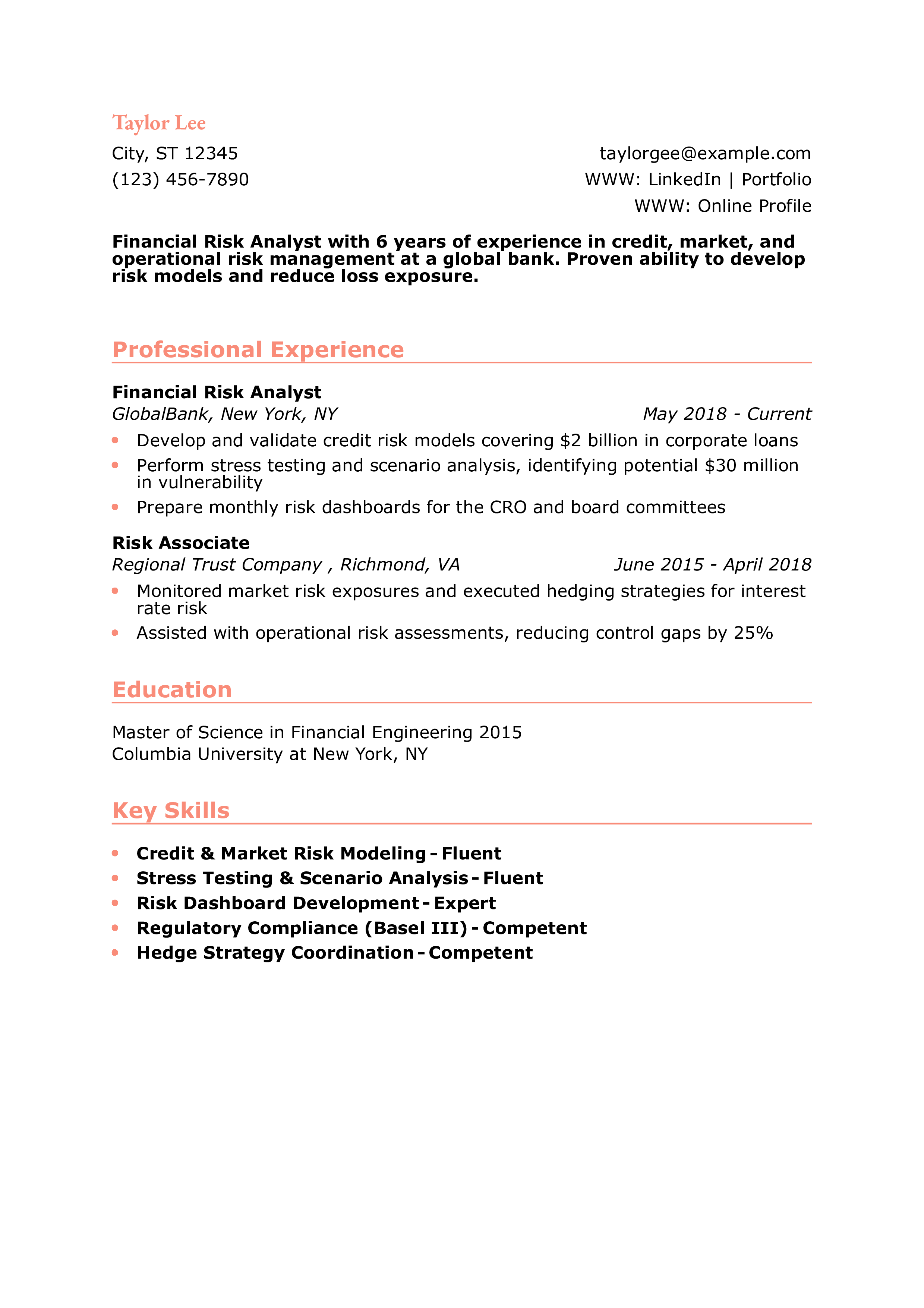
Why This Resume Is a Great Example
Taylor’s resume quantifies a $30 million vulnerability discovery and coverage of $2 billion in loans, showcasing tangible risk‐management impact. The clear, metric‐driven bullets make it easy for hiring managers to assess technical expertise.
Key Tips
Include dollar amounts and percentages to highlight your risk‐mitigation achievements; for more guidance, see our technical skills for a resume.
Financial Systems Analyst Resume
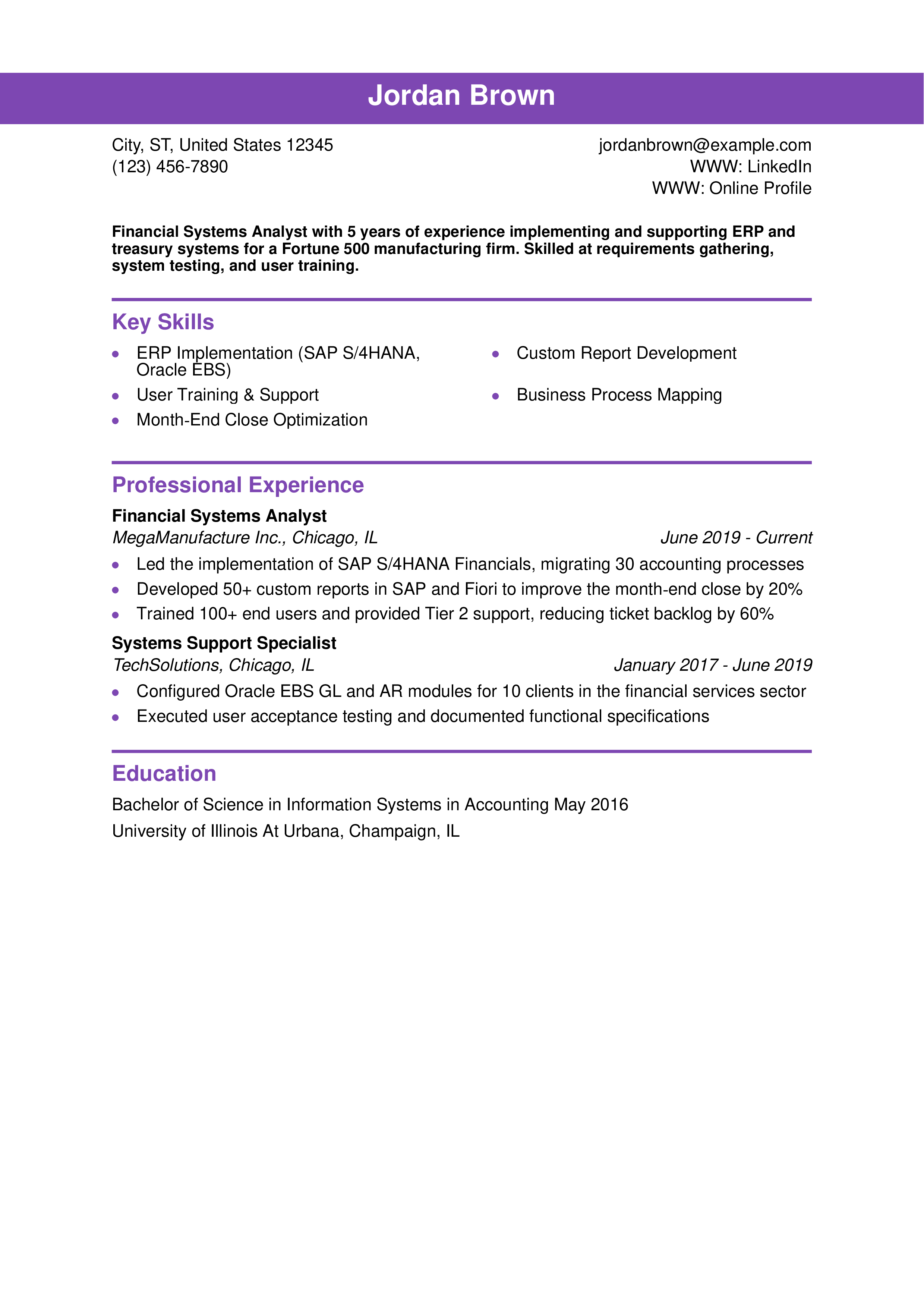
Why This Resume Is a Great Example
Jordan’s resume highlights a 20% faster month‐end close and 60 % ticket backlog reduction, impactful metrics demonstrating system optimization expertise. The mix of implementation and support skills shows well‐rounded capabilities.
Key Tips
Quantify process improvements (e.g., “month‐end close by 20%”) to showcase system proficiency; learn more in the best resume formats.
Healthcare Financial Analyst Resume
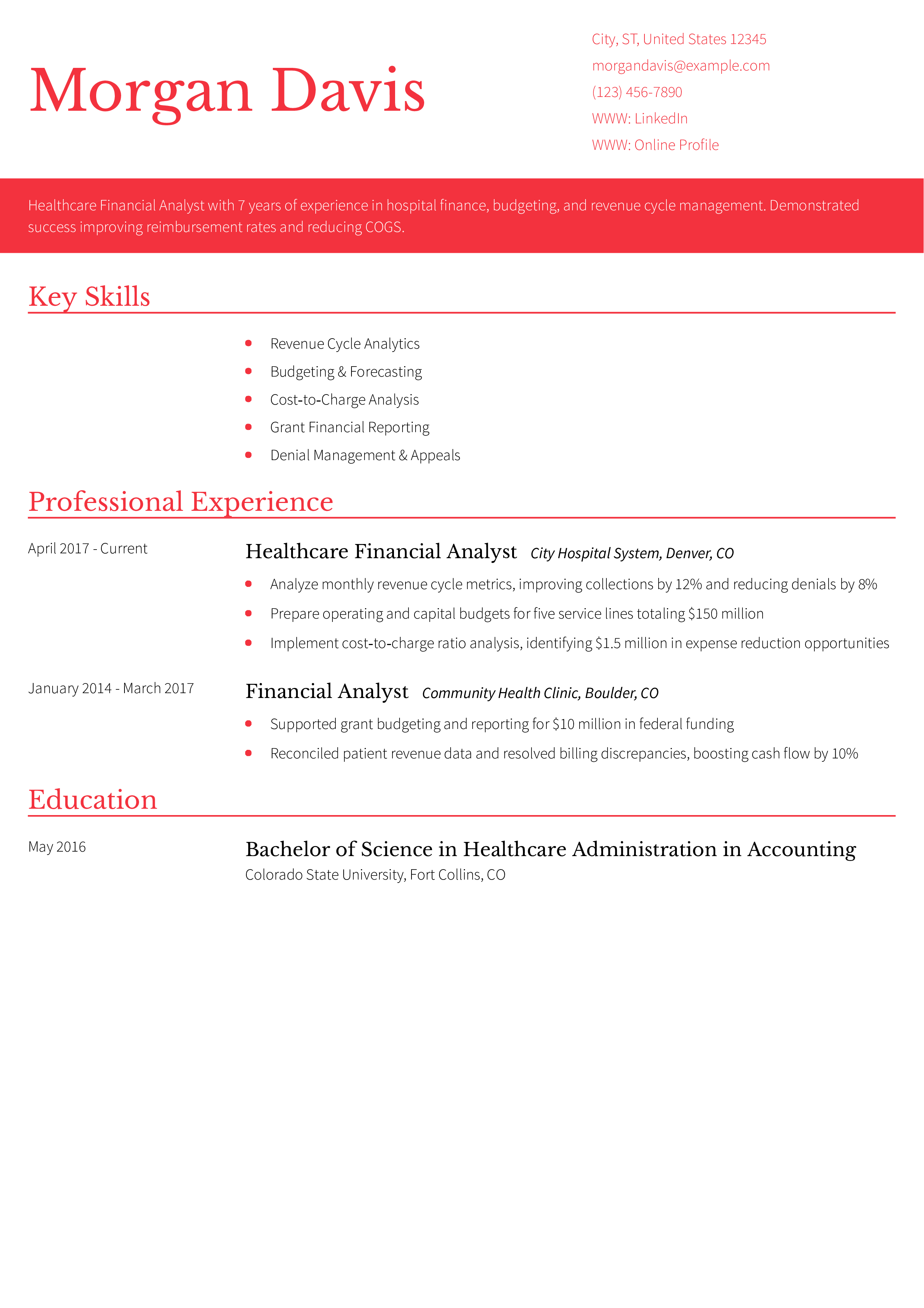
Why This Resume Is a Great Example
Morgan’s resume quantifies a 12% increase in collections and $1.5 million in cost reductions, illustrating direct financial impact in healthcare. The combination of budgeting and revenue‐cycle skills demonstrates breadth.
Key Tips
Include percentage improvements in collections or cost savings to highlight impact; see our resume skills article for more.
Junior Financial Analyst Resume
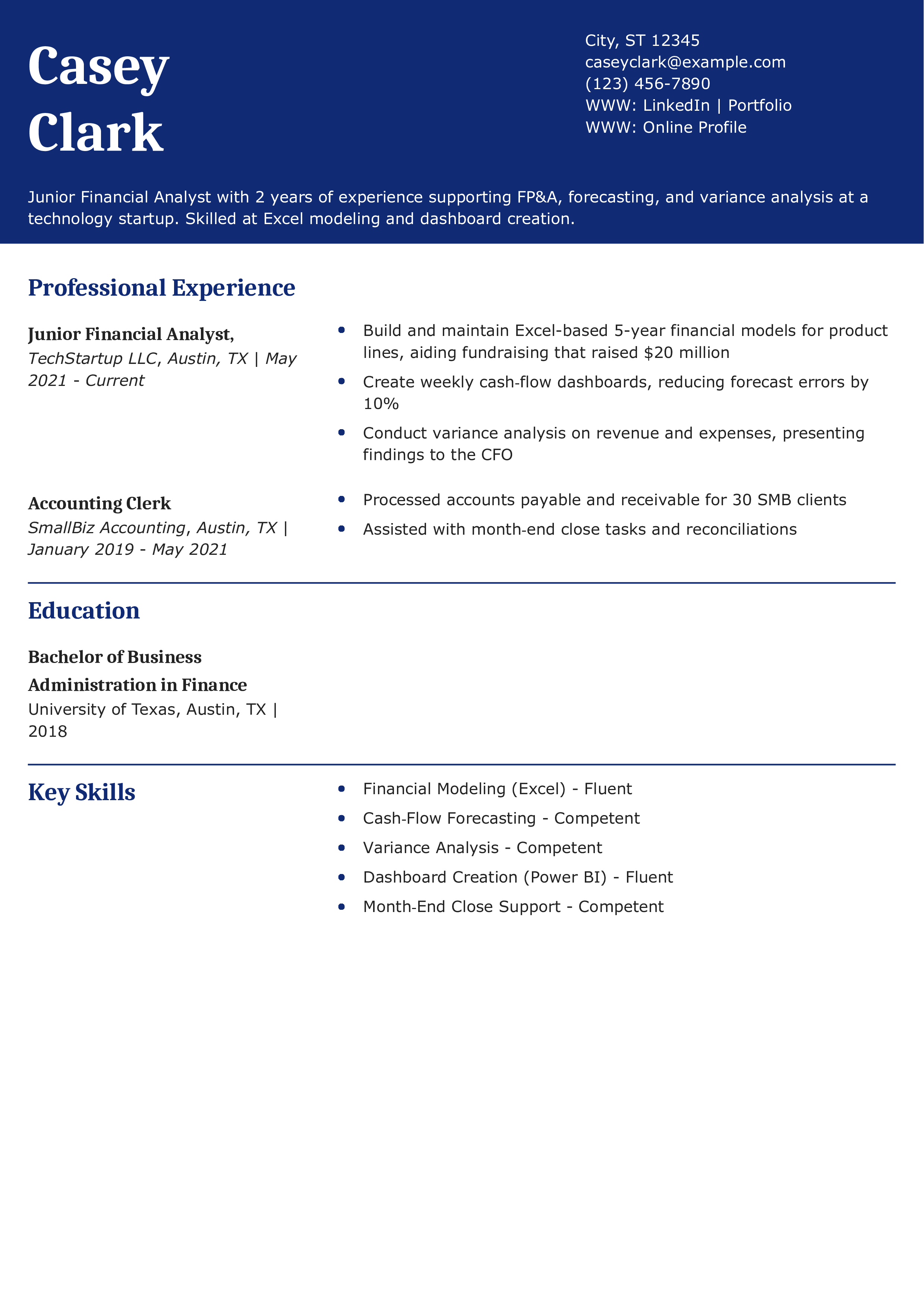
Why This Resume Is a Great Example
Casey’s resume ties a $20 million fundraising outcome to their modeling work and quantifies forecast‐error reduction, clearly linking junior‐level efforts to major business results.
Key Tips
Even early‐career analysts should highlight fundraising or forecast successes; check our resume objective examples for inspiration.
Real Estate Financial Analyst Resume
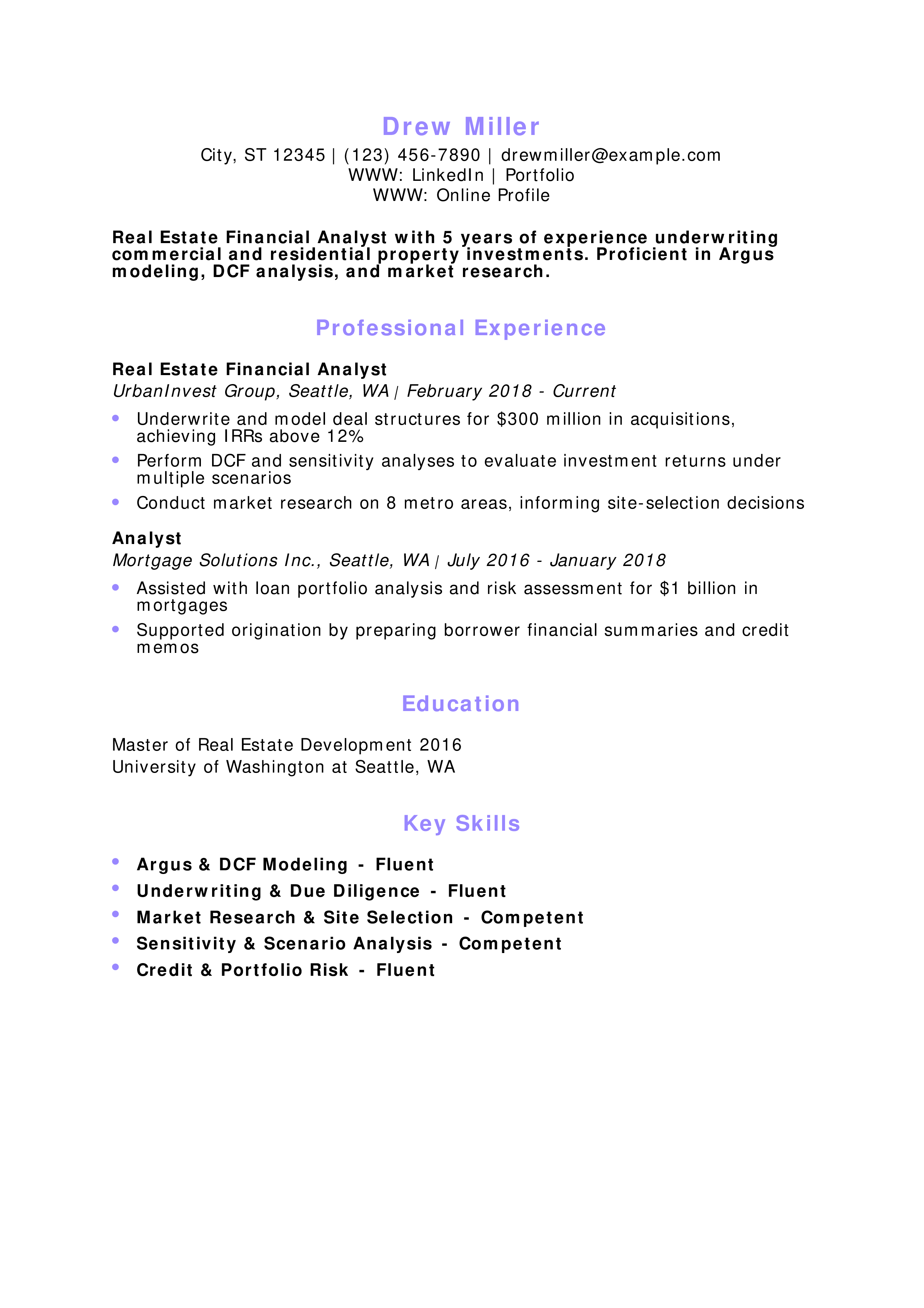
Why This Resume Is a Great Example
Drew’s resume features $300 million in underwriting volume and 12%+ IRRs, demonstrating high‐stakes financial modeling skills. The clear breakdown of tools and analyses shows domain expertise.
Key Tips
Quantify deal size and IRR to showcase real estate impact; learn more in the best resume formats.
Accounting Assistant Resume
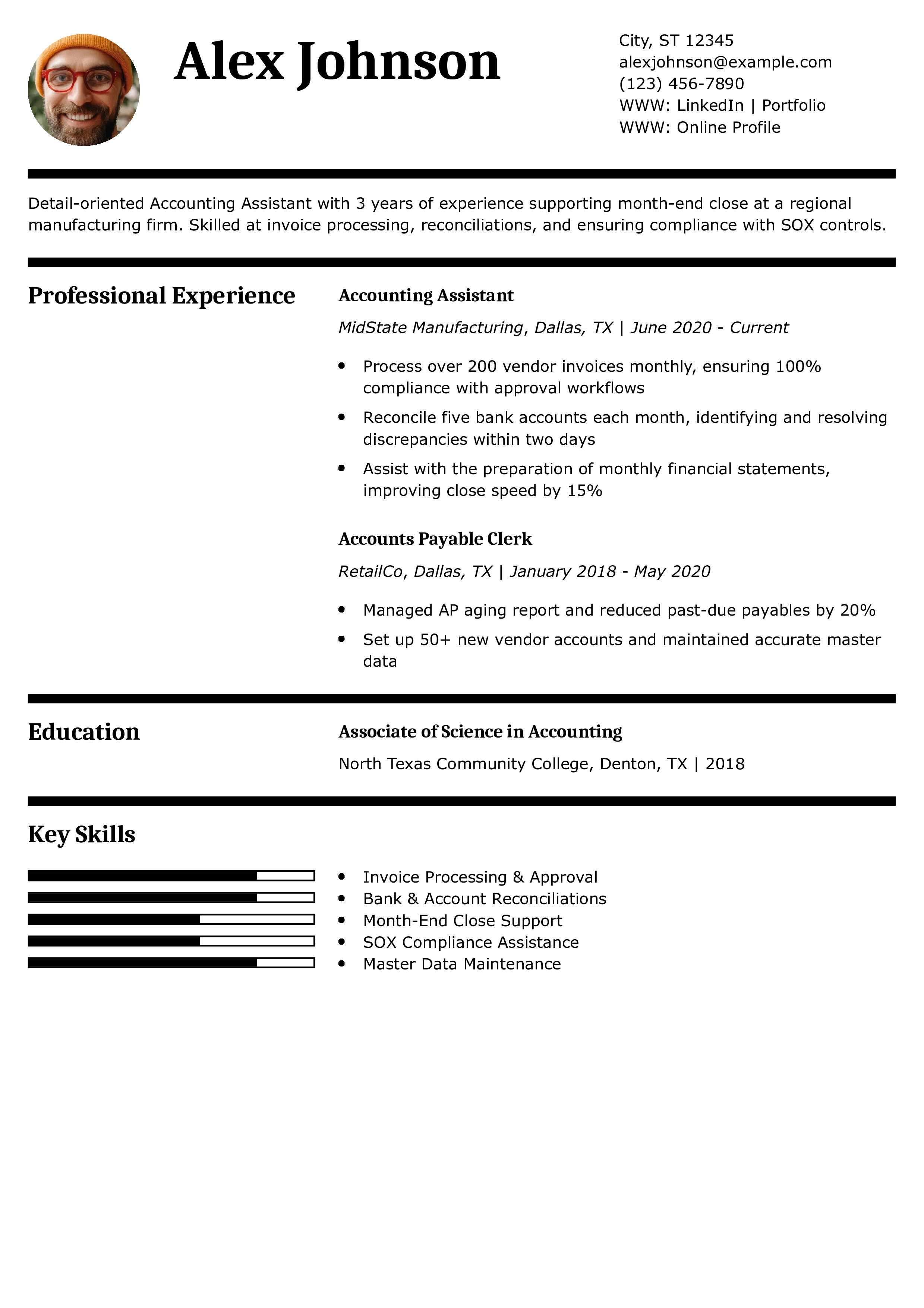
Why This Resume Is a Great Example
Alex’s resume clearly quantifies a 15% faster close and a 20% reduction in past-due payables, demonstrating tangible process improvements. The concise structure lets hiring managers quickly see both technical skills and impact.
Key Tips
Emphasize process improvements with percentages to highlight efficiency gains; learn more in our best resume formats.
Experienced Accounting Assistant Resume
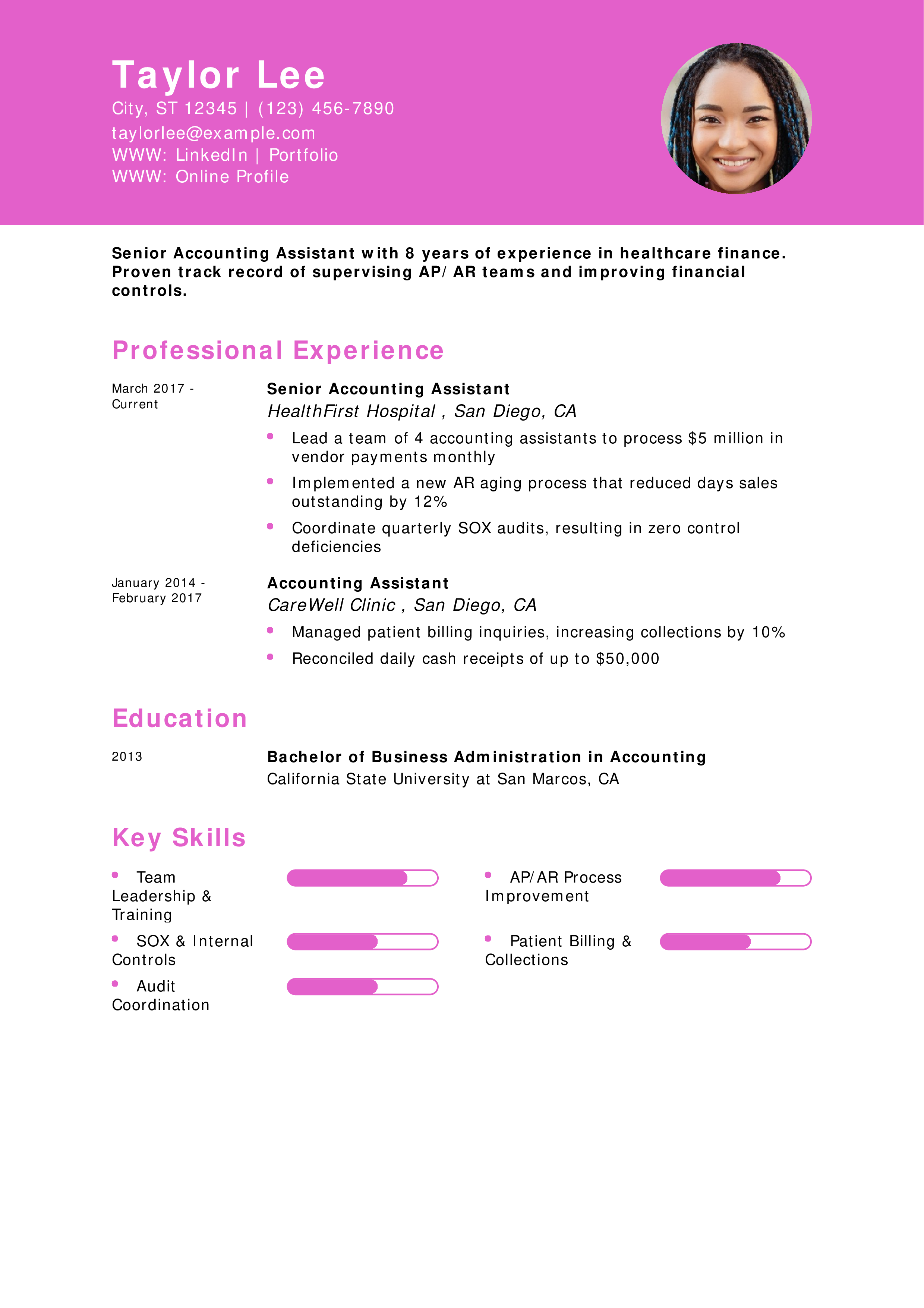
Why This Resume Is a Great Example
Taylor quantifies a 12 % reduction in DSO and leads a team managing $5 million in payments, showcasing leadership and impact. The focus on zero audit deficiencies underlines strong control expertise.
Key Tips
Highlight audit and control achievements to show compliance strength; see our how to list certifications on a resume guide for tips.
Accounting Assistant (No Experience) Resume
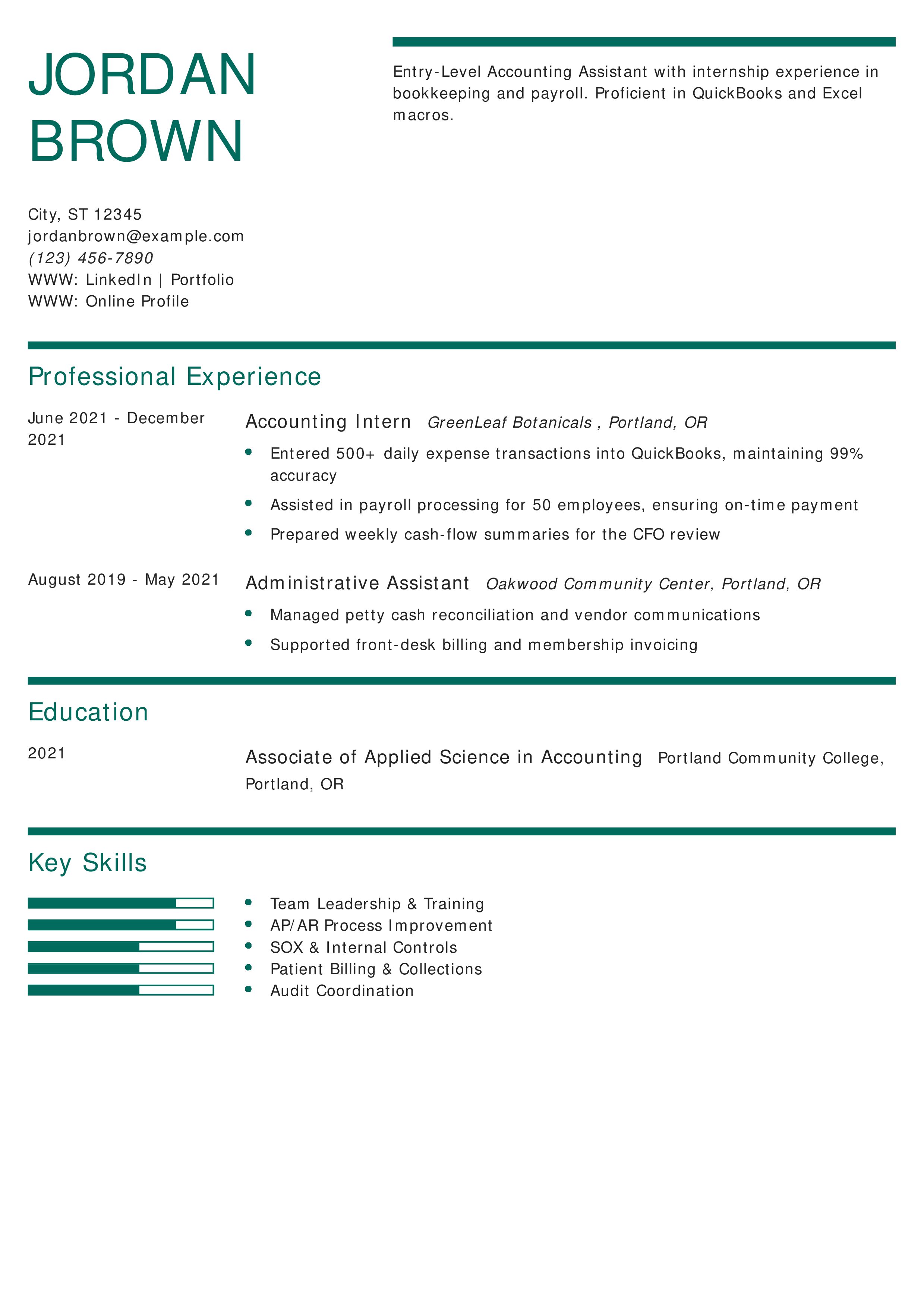
Why This Resume Is a Great Example
Jordan’s resume ties a 99% data-entry accuracy and timely payroll processing directly to business needs, showing reliability and technical proficiency. The internship bullets clearly demonstrate hands-on experience.
Key Tips
Early-career candidates should spotlight accuracy rates and technology skills; review our resume objective examples to craft a strong opening.
Accounting Administrative Assistant Resume
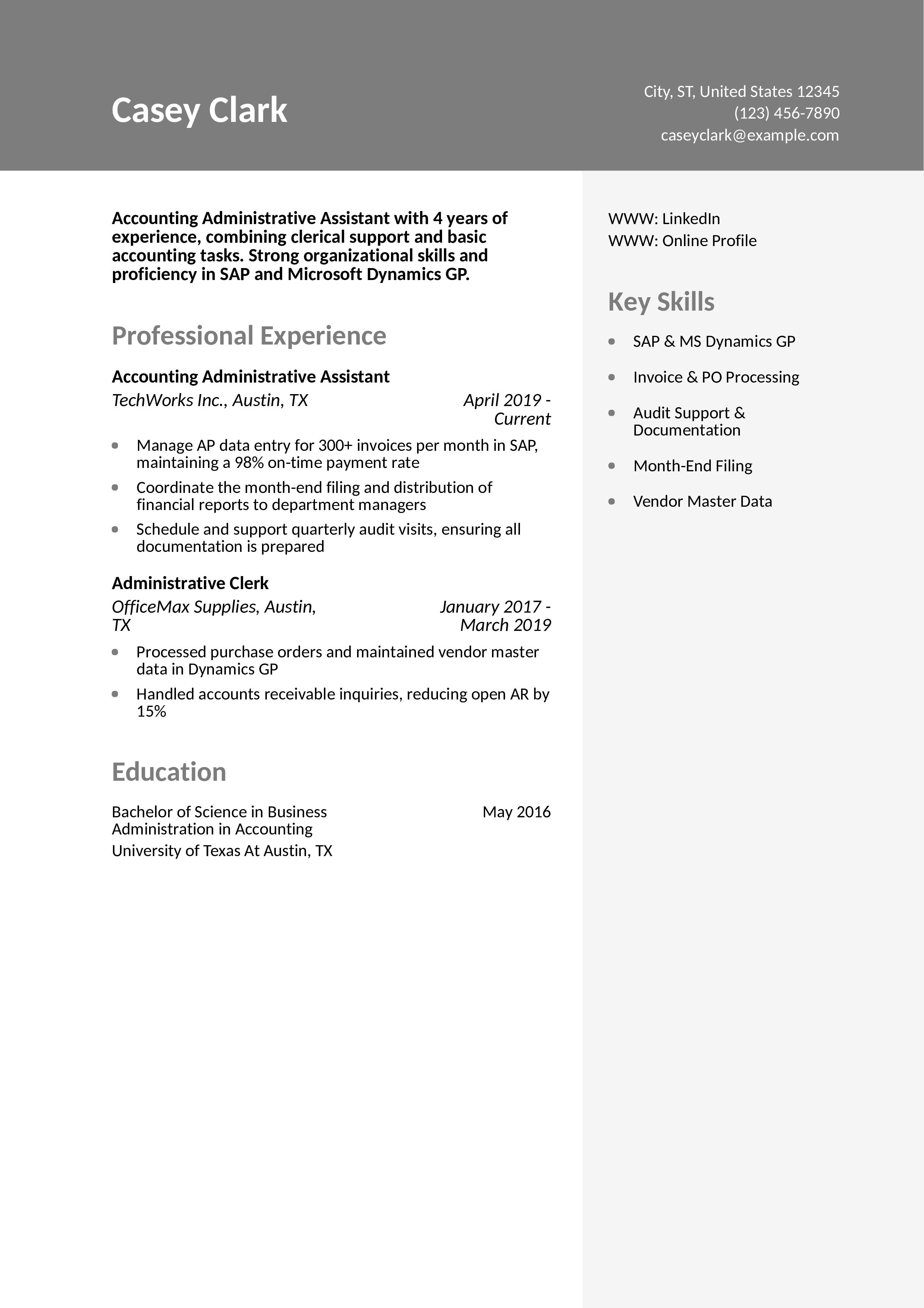
Why This Resume Is a Great Example
Casey’s resume highlights a 98% on-time payment rate and a 15% reduction in open AR, demonstrating both clerical precision and tangible impact. The mix of ERP systems showcases technical versatility.
Key Tips
Include system names (SAP, Dynamics GP) and metrics to show ERP proficiency; check out our resume language skills article for more on formatting tech skills.
Virtual Accounting Assistant Resume
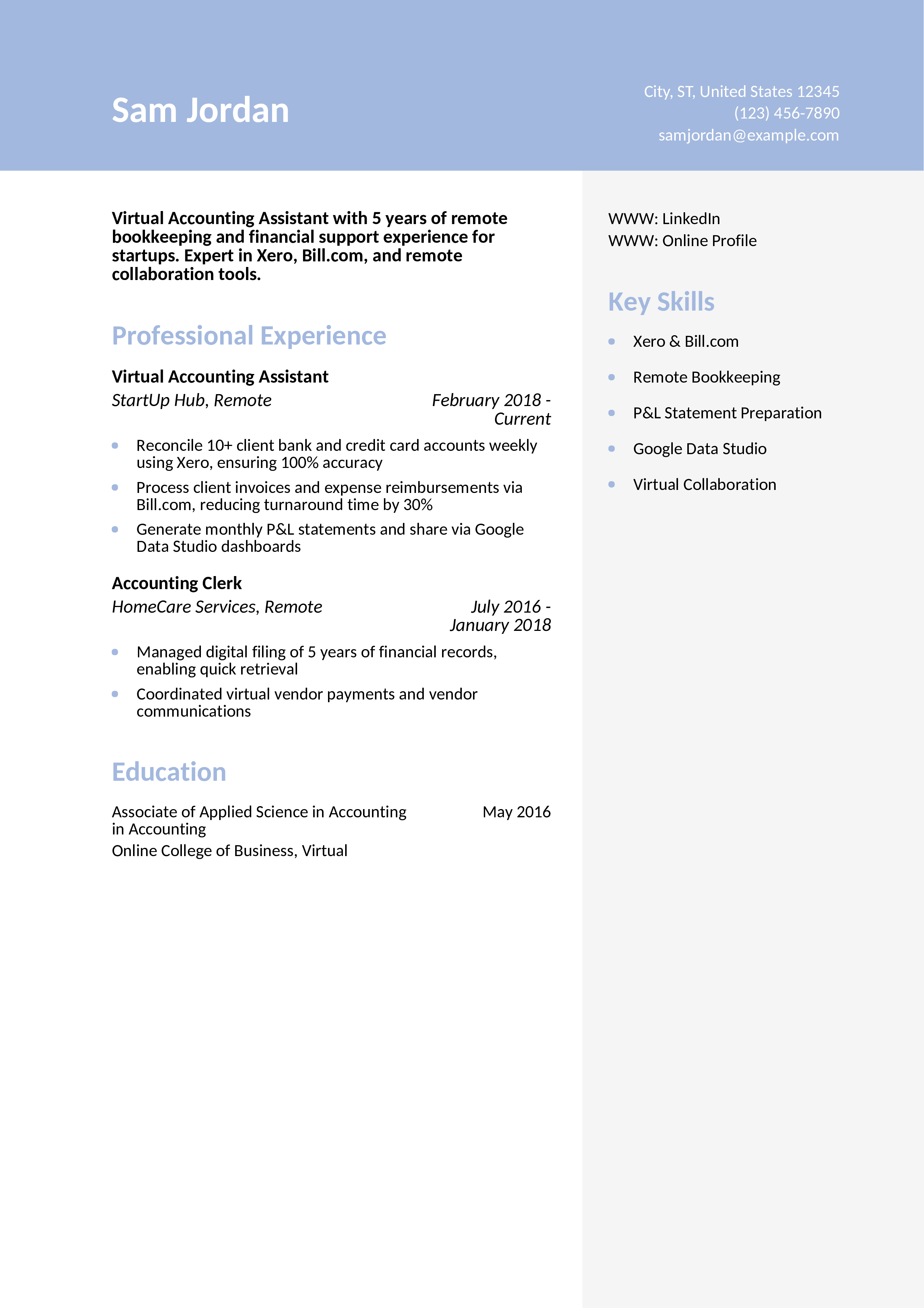
Why This Resume Is a Great Example
Sam’s resume ties a 30 % faster expense process and 100 % reconciliation accuracy to virtual tools, proving remote bookkeeping effectiveness. The clear tool list reassures hiring managers of technical readiness.
Key Tips
When applying remotely, emphasize virtual tools and metrics; for more, see our guide on what to put on a resume.
Our templates are crafted by professional resume writers to make creating your resume quick, easy, and effective.
- Professional resume template downloads
- Customized cover letter generation
- AI resume writing support
- Career-building resources and advice
Accounting Assistant Text-Only Resume Templates and Examples
How To Write an Accounting Assistant Resume
1. Summarize your accounting assistant qualifications in a dynamic profile
When writing a profile for an accounting assistant resume, focus on your strengths and experience in the field. Your profile should be a brief summary of your qualifications and background tailored to the specific job you are applying for.
Here are some tips for writing an effective profile:
- Keep it concise: It must be no more than five sentences long. It should be a brief summary of your qualifications and experience.
- Highlight your strengths: Your profile needs to emphasize the strengths most relevant to the position you are applying for.
- Tailor it to the job: Adjust it to the specific job you are applying for. Make sure to read the job posting carefully and include your key credentials that match the requirements of the position.
Remember your profile is often the first thing a potential employer will read on your resume, so it’s important to make sure it’s well-written and tailored to the specific job you are applying for.
Senior-Level Profile Example
Efficient Accounting Assistant with 12+ years of experience supporting local healthcare providers. Recent demonstrated success in a leadership role training new hires. Expert knowledge of Microsoft Excel and accountancy programs. Apply advanced mathematical reasoning skills to quickly find and correct accountancy errors.
Entry-Level Profile Example
Accounting Assistant with 2 years’ experience providing diligent support to a major flooring retailer. Skilled at auditing, record-keeping, and finding and correcting discrepancies. Collaborative and efficient work style, with a talent for processing payroll accurately.
2. Create a powerful list of your accounting assistant experience
To describe your professional accounting experience, you can follow this process:
- List your best accomplishments: Make a list of your achievements most relevant to the position you’re applying for. Accomplishments in similar roles in the financial industry are best.
- Include relevant numbers when possible: Percentages and dollar amounts can show the extent of your abilities because they provide easily quantifiable metrics. As you look over your list of accomplishments, consider these questions:
- How much: Think about how much money or time you saved the organization or by what percent you lowered spending or reduced errors.
- How quickly: If you saved time or finished work ahead of schedule, include how many hours or days you saved.
- How many: Include numbers like the size of any teams you supervised, how many departments participated in your initiatives, and how many people attended your trainings.
- Use action verbs: Emphasize your role by using strong active verbs like “drove” or “accelerated.” These are more vivid than phrases like “was responsible for” or “participated in,” and they show your role more clearly.
Remember to tailor your accomplishments to the specific job you are applying for and keep them concise and easy to read.
Senior-Level Profile Example
Senior Accounting Assistant, Three Crosses Regional Hospital, Las Cruces, NM | July 2015 to Present
- Supervise 10 accounting assistants and check financial records before delivery
- Help onboard, train, and develop employees in coordination with senior leaders
- Process journal and accounts payable vouchers, and add them to the general ledger with 100% accuracy
Highlights:
- Reduced accounting support team errors by 54%
- Devised and delivered a training scheme to improve colleagues’ grasp of Microsoft Excel functions, including v-lookups and pivot tables
Entry-Level Profile Example
Accounting Assistant, Carpet One Floor & Home, Tucson, AZ | November 2020 to Present
- Help senior accountants generate sales tax reports and perform yearly audits
- Process monthly payroll for branch employees, updating information as needed to ensure payment accuracy
- Maintain 100% compliance with company policies and state and federal guidelines
Highlights:
- Praised 4X during performance reviews for collaboration and communication skills
- Completed tasks quickly and accurately, meeting 99% of deadlines in 2021
3. Include accounting assistant-related education and certifications
Accounting assistants typically do not need advanced degrees or licenses to qualify for employment. However, most employers prefer candidates who have completed undergraduate programs in accounting, business, or similar fields.
Accounting hopefuls can also self-train for the profession in various ways, including by pursuing certifications. If you’re looking to add some certifications to your resume, you could consider Certified Bookkeeper (CB). This certification is offered by the American Institute of Professional Bookkeepers (AIPB) and requires passing an exam and having at least two years of bookkeeping experience.
While certifications can be beneficial, they are usually not mandatory for accounting assistant positions. Employers are often more interested in your skills and experience than your certifications.
Education
Template
- [Degree Name]
- [School Name], [City, State Abbreviation] | [Graduation Year]
Example
- Associate of Science in Business Administration (Accounting)
- Pima Community College, Tucson, AZ | 2019
Certifications
Template
- [Certification Name], [Awarding Organization] | [Completion Year]
Example
- Certified Bookkeeper (CB), American Institute of Professional Bookkeepers | 2010
4. List key accounting assistant skills and proficiencies
Companies looking to fill a position often use an applicant tracking system (ATS), which scans each submitted resume for keywords relevant to the job at hand. When the ATS scans a resume with many relevant keywords, it’s more likely to flag the document for the hiring manager.
For this reason, add a keyword-rich “Skills” or “Expertise” section to your resume. With this section, you can show the breadth of your skill set and boost the chance your application gets noticed. Below are common keywords for an accounting assistant:
| Key Skills and Proficiencies | |
|---|---|
| Accounting software | Accounts payable |
| Accounts receivable | Bookkeeping |
| Clerical support | Customer service |
| Mathematical reasoning | Microsoft Excel |
| Payroll administration | Record-keeping |
| Report preparation | Teamwork |
| Time management | |
How To Pick the Best Accounting Assistant Resume Template
As with most vocations, accounting assistants should use a resume template that’s clear and straightforward. Opt for a layout that lets the hiring manager quickly review your best career details. Select a traditional resume font, and avoid any template with a colorful or elaborate design. Also, ensure the template complies with ATS used by employers to screen resumes.
Frequently Asked Questions: Accounting Assistant Resume Examples and Advice
How do I optimize my Accounting Assistant CV to get noticed by hiring managers?-
To optimize your Accounting Assistant CV, begin by showcasing measurable achievements that demonstrate the value you’ve brought to previous employers. Use action verbs and specific examples to highlight your contributions. Incorporating industry-specific keywords, particularly in the skills and professional experience sections, will help your CV stand out, especially with ATS systems.
What are common action verbs for accounting assistant resumes?-
One of the most common (yet avoidable) resume mistakes is using too few verbs. When you repeat the same generic verb (say, “Manage”) several times, it distracts the reader and fails to show the dynamic nature of your work. You can prevent this issue by using a healthy variety of action verbs. Consider the following options:
| Action Verbs | |
|---|---|
| Analyze | Assist |
| Audit | Balance |
| Calculate | Correct |
| Enter | Identify |
| Investigate | Leverage |
| Prepare | Process |
| Report | Resolve |
| Support | |
How do you align your resume with an accounting assistant job posting?-
According to the Bureau of Labor Statistics, job opportunities for accounting assistants are expected to decline by 6% over the next decade. This decline makes the market competitive, so tailoring your resume to the job posting is more important than ever.
Hiring managers advertise positions with their ideal candidate already in mind, and they often include detailed job descriptions to attract the most relevant candidates. Include as many of the key competencies mentioned in the job posting as possible when writing your resume. This makes it easy for employers to see how you can deliver on their must-haves. It can also make your resume shine among large volumes of generic applications.
Hiring managers tend to list the most essential factors and qualifications first and may repeat them for emphasis. Check that your resume mirrors the skills and responsibilities set out in the job posting. Give concrete examples of your experience, ideally with hard numbers to back them up, and avoid vague summaries of your duties.
What is the best accounting assistant resume format?-
The combination format is a popular choice for an accounting assistant resume because it allows you to highlight both your skills and experience. This format is particularly useful if you have some relevant experience but not enough to fill an entire page. By using the combination format, you can showcase your skills and experience in a way that is easy for hiring managers to read and understand.
What’s the ideal length for an accounting assistant resume?-
A one-page resume is ideal for most accounting assistant positions, especially if you have less than 10 years of experience. For experienced professionals, a two-page resume may be appropriate, but only if it includes valuable, job-relevant content. Focus on showcasing your key achievements, certifications, and skills that align with the job description.
Aim to include work experience from the last 10 to 15 years. Older roles can be summarized or omitted unless they add significant value. Keeping your resume concise and relevant will leave a strong impression on hiring managers.
Craft your perfect resume in minutes
Get 2x more interviews with Resume Builder. Access Pro Plan features for a limited time!

Once your resume is complete, write a cover letter to include with each application. This is a great opportunity to speak directly to the hiring manager and make a case for why you’re the best candidate for the job.
Remember, a cover letter should be fairly succinct. Don’t exceed more than 400 words — 250 to 300 is ideal. For more information and ideas, view our finance cover letter examples.




